Backyard Putting Greens
- Home
- Residential Applications
- Pages
- Backyard Putting Greens
Artificial Turf Backyard Putting Greens — Perfect Your Short Game At Home!
Backyard putting greens have surged in popularity in recent years, driven by several factors. Firstly, the rise of home-based recreation and leisure activities, particularly during times when outdoor entertainment options are limited, has led homeowners to seek innovative ways to enhance their outdoor living spaces.
Additionally, the growing interest in golf as a recreational sport has inspired many enthusiasts to invest in private putting greens for convenient practice and enjoyment. With advancements in synthetic turf technology, homeowners can now create realistic and functional putting greens that rival those found on professional golf courses, further fueling the trend.
Backyard putting greens offer homeowners a convenient, low-maintenance, and enjoyable way to practice their golf game at home. With their growing popularity and numerous benefits, these custom-designed synthetic grass installations are transforming residential properties into private golfing retreats, where homeowners can perfect their putting skills and enjoy endless hours of outdoor recreation and relaxation.
Enhance Your Health & Well-Being
Having an artificial turf backyard putting green is more than just a recreational luxury—it’s a pathway to improved health and well-being right in your own backyard. The convenience of having a putting green at home means you can easily incorporate golf practice into your daily routine, without the hassle of driving to a course or dealing with crowded facilities. This accessibility encourages regular physical activity, promoting cardiovascular health, muscle tone, and flexibility.
Golf itself offers numerous health benefits, including stress reduction, mental focus, and improved hand-eye coordination. With a backyard putting green, you’ll not only enhance your golf game but also elevate your overall health and fitness levels, all while enjoying the convenience and comfort of home.

Backyard Putting Green Customizations
To enhance backyard putting greens, homeowners can incorporate various customizations to create a tailored and immersive golfing experience. Options include bunkers, flagsticks, extra cups, chipping mats, undulations, fringe and rough layers, and more.
- Bunkers add challenge and variety to the green, simulating real course conditions and allowing players to practice sand shots.
- Flagsticks provide visual targets and aid in distance judgment.
- Extra cups offer versatility for practicing different angles and distances.
- Chipping mats enable players to practice short game shots.
- Undulations, fringe, and rough layers add realism and complexity to the green surface.
By incorporating these customizations, homeowners can create a backyard putting green that meets their specific needs and preferences, enhancing enjoyment and skill development.
Golf Green System Components
The image below (courtesy of SYNLawn) provides an overview of the individual components of an artificial turf backyard putting green system. It also highlights the features and specs you should look for when considering turf products for your project.

Putting Green Turf
• Fibers: Nylon or Polypropylene
• Pile Height: 0.3" to 0.5"
• Face Weight: 40 oz - 60 oz / sq. ft.
• Total Weight: 70 oz - 85+ oz / sq. ft.
Golf Cup & Flagstick
• Plastic or aluminum golf cups
• Typically 4" or 6" deep
Sub-Base (2")
• Leveling Layer
• Decomposed granite (DG)
• Smooths contours & undulations
Backing
• Typically embossed rubber
• Non-permeable
• No drainage holes
Sub-Base (3" to 6")
• Aggregate base layer
• Class II Road Base
• Crushed Miscellaneous Base (CMB)
Native Soil
Putting Green Turf Features
Features to Look for in Artificial Grass for Backyard Putting Greens:

Durability:
A high-quality putting green turf product should be constructed from durable materials such as polyethylene or nylon fibers, which are known for their resilience and longevity. Look for turf with a high stitch rate and dense construction to ensure superior durability and resistance to wear and tear.
Additionally, a strong backing material, such as polyurethane or latex, enhances stability and prevents fraying or unraveling of the turf fibers over time. UV stabilization additives further enhance durability by protecting the turf from fading and deterioration due to sun exposure, ensuring a long-lasting and vibrant putting green surface.


Pile Height:
When selecting turf for a backyard putting green, opt for a low pile height between 0.3” to 0.5” (8-12 mm). A shorter pile height provides better ball roll and more consistent putting performance, closely resembling the smooth, fast greens found on professional golf courses.
Lower pile heights also minimize interference with putting lines and reduce the risk of ball deviation, allowing for precise putting and accurate shot execution. Overall, a shorter pile height ensures optimal performance and realism, enhancing the overall golfing experience on your backyard putting green.
UV Protection:
UV protection is essential for maintaining the appearance and performance of a backyard putting green over time. Exposure to sunlight can cause fading, discoloration, and degradation of turf fibers, leading to a diminished playing surface and reduced longevity.
Choose putting green turf with built-in UV stabilization additives, which help to shield the turf from harmful UV rays and minimize damage from sun exposure. UV-protected turf maintains its vibrant color, durability, and performance, ensuring that your backyard putting green remains pristine and playable for years to come, even in sunny climates.


Safety:
Synthetic golf green turf products manufactured in the USA will be free from contaminants like lead or other heavy metals. Synthetic grass also eliminates the need for chemicals like fertilizers and pesticides, which pose a health risk to children and pets.
Reducing exposure to these elements creates a safer and cleaner environment for you and your family. Make sure any turf products you consider for your backyard putting green was manufactured in the U.S.A., is lead-free, PFAS-free, and non-toxic.
Infill Options
What's the Best Infill for Backyard Putting Greens?
Infill for Putting Greens:
For backyard putting greens, the best infill option is typically silica sand, cork, walnut shells, or crumb rubber. Silica sand provides ballast and stability to the turf fibers, ensuring a smooth and consistent putting surface. It also helps to control ball speed and roll, allowing for precise shot execution and realistic putting conditions.
Additionally, silica sand infill enhances drainage and prevents turf deformation, ensuring long-term performance and durability of the putting green. Avoid infill materials that are too heavy or dense, as they may interfere with ball roll and affect putting performance.

Sub-Base Preparation
What Type of Sub-Base Offers the Best Putting Surface?
Sub-Base Material:
A granular sub-base composed of compacted aggregate material, such as decomposed granite (DG) or Class II Road base, offers the best foundation for a backyard putting green. The sub-base material provides stability, drainage, and support for the turf, ensuring a smooth and uniform putting surface.
Proper compaction of the sub-base is crucial to prevent settling, shifting, or unevenness of the turf over time. A common practice amongst installers is to use several inches of Class II Road Base topped with a layer of Decomposed Granite (DG). This provides a smooth surface that performs like a natural grass putting green.

Benefits of Installing a Backyard Putting Green
More Practice Time
With a backyard putting green, homeowners have 24/7 access to a convenient practice area just steps away from their homes. Gone are the days of driving to the golf course or waiting for tee times – now, golf enthusiasts can hone their putting and chipping skills at their leisure, any time of day or night.
Improved Putting Skills
Putting is one of the most difficult golf skills to master. An artificial turf backyard putting green will help improve your putting skills by giving you a consistent surface to practice on. You can use the slopes and contours built into your custom-designed golf green to simulate the conditions you might encounter on a real course.
Year-Round Use
Natural grass putting greens require constant maintenance and can become unplayable during inclement weather or off-seasons, artificial turf putting greens offer year-round usability. Rain or shine, summer or winter, youy can enjoy consistent putting conditions without worrying about maintenance or weather-related damage.
Aesthetic Appeal
A backyard putting green enhances the aesthetic appeal of outdoor spaces, adding a touch of elegance and sophistication to residential landscapes. With lush, lifelike synthetic turf and professional-quality design features, you’ll not only have a space for golf practice but also elevate the overall look and value of your property.
Customization
Backyard putting greens can be custom-designed to fit any space, shape, or terrain, allowing homeowners to maximize their outdoor areas and create a personalized golfing experience. From small practice greens to sprawling putting courses with multiple holes, bunkers, and contours, the possibilities are endless.
Low-Maintenance
Artificial turf requires minimal upkeep compared to natural grass, making backyard putting greens a hassle-free investment. With no need for mowing, watering, fertilizing, or pest control, homeowners can spend less time on maintenance chores and more time working on their short game and perfecting putting skills.
Projects By Our Members
Click an image to visit that turf company’s listing in the Turf Network’s directory.
FAQs
Will practicing on a backyard putting green really improve my game?
Absolutely! Backyard Putting Greens offer an exceptional opportunity to enhance your short game skills. Crafted from durable artificial turf, these greens provide a consistent surface that outlasts natural grass, eliminating the need for frequent replacements. The reliable surface ensures a more predictable ball lie, allowing you to focus on refining your technique. Particularly beneficial for honing speed control, practicing on your home green enables you to master the intricacies of putting. By investing in a Backyard Putting Green, you’re making a valuable commitment to elevating your golf game and achieving greater success on the course.
Which is better for a putting green: artificial turf or natural grass?
When it comes to choosing between artificial turf and natural grass for your backyard putting green, there are several factors to consider. Artificial turf offers numerous advantages over natural grass, making it the preferred choice for many homeowners.
- Durability: Artificial turf is exceptionally durable and long-lasting compared to natural grass. Its resilient nature ensures that it maintains its quality and appearance over time, reducing the need for frequent maintenance or replacement.
- Consistency: Artificial turf provides a consistent surface in terms of both appearance and performance. Unlike natural grass, which can vary in texture and condition, artificial turf ensures that every putt behaves predictably, allowing for more accurate practice sessions.
- Forgiveness: The forgiving nature of artificial turf makes it easier to achieve successful putts. Its even surface and uniform texture minimize variations in ball roll, helping players focus on improving their technique without being hindered by inconsistencies in the turf.
- Affordability: Artificial turf is generally more affordable than natural grass in the long run. While the initial investment may be higher, the reduced maintenance requirements and longer lifespan of artificial turf result in significant cost savings over time, making it a practical choice for budget-conscious homeowners.
How does an artificial turf golf green receive a shot?
Artificial turf golf greens are meticulously designed to emulate the look, feel, and performance of real grass. From appearance to ball reception and putting, synthetic turf provides an authentic golfing experience, ensuring every shot is met with consistent and reliable performance.
How long will an artificial turf golf green last?
Most artificial turf putting greens feature Nylon or Polypropylene fibers engineered to withstand the elements, including rain, snow, ice, and sun exposure. With proper maintenance, typically once or twice a year, your artificial turf putting green can endure well over 15 years, ensuring years of enjoyment and performance.
Are synthetic turf putting greens eco-friendly?
YES! Artificial grass backyard putting greens are 100% eco-friendly. They require no watering, fertilizing, trimming, or mowing, significantly reducing carbon emissions and environmental impact while also helping to conserve water. Backyard golf greens provide a sustainable and low-maintenance solution for golf enthusiasts.
What is the minimum area required to install a backyard putting green?
There isn’t a minimum requirement for putting green size, however, a good starting point is a minimum area of 150 sq. ft. to ensure sufficient space for challenging putts. However, the versatility of artificial grass means that it can be installed in just about any location, including around trees, corners, pools, and other objects, allowing for customized designs to fit your unique space and preferences.
How long does it take to install a backyard putting green?
Installation time varies based on project size and complexity. While small, simple greens can be completed in a day, larger or more intricate designs may take a week or more. Typically, most backyard putting greens are installed within 2 – 3 days, ensuring minimal disruption and quick enjoyment of your new green.
Can putting greens be installed indoors as well as outdoors?
Yes, artificial turf can be used to create outdoor as well as indoor golf greens for residential and commercial properties, providing versatile solutions to suit any environment and golfing preference.
What maintenance does an artificial turf putting green require?
Artificial grass putting greens require minimal maintenance, with regular debris removal to keep the surface clean. With little upkeep required, you can enjoy consistent performance and aesthetics year-round, making artificial turf an ideal choice for hassle-free golfing enjoyment. Depending on the wind and foot traffic, your golf green may need to have the infill material replenished annually.
How much does an artificial turf backyard putting green cost?
This is one of the most frequently asked questions about artificial turf putting greens, and one of the most difficult to answer. As a general rule, an artificial grass putting green costs between $15 and $30+ per square foot which includes design, materials, and installation. The costs can vary significantly based on the size of the green, turf product being used, putting green features, and other site-specific factors. To get a better idea of the cost, we’ve built a putting green cost calculator that enables you to factor in the costs of additional features and enhancements.
Artificial Turf Resources
Become a Turf Network PRO Today!
Grow Your Turf Company With Us!
Connect with homeowners and businesses actively seeking artificial turf solutions.
![Turf Network Color Logo [500 x 100]](https://turfnetwork.org/wp-content/uploads/2023/10/Turf-Network-Color-Logo-500-x-100.png)

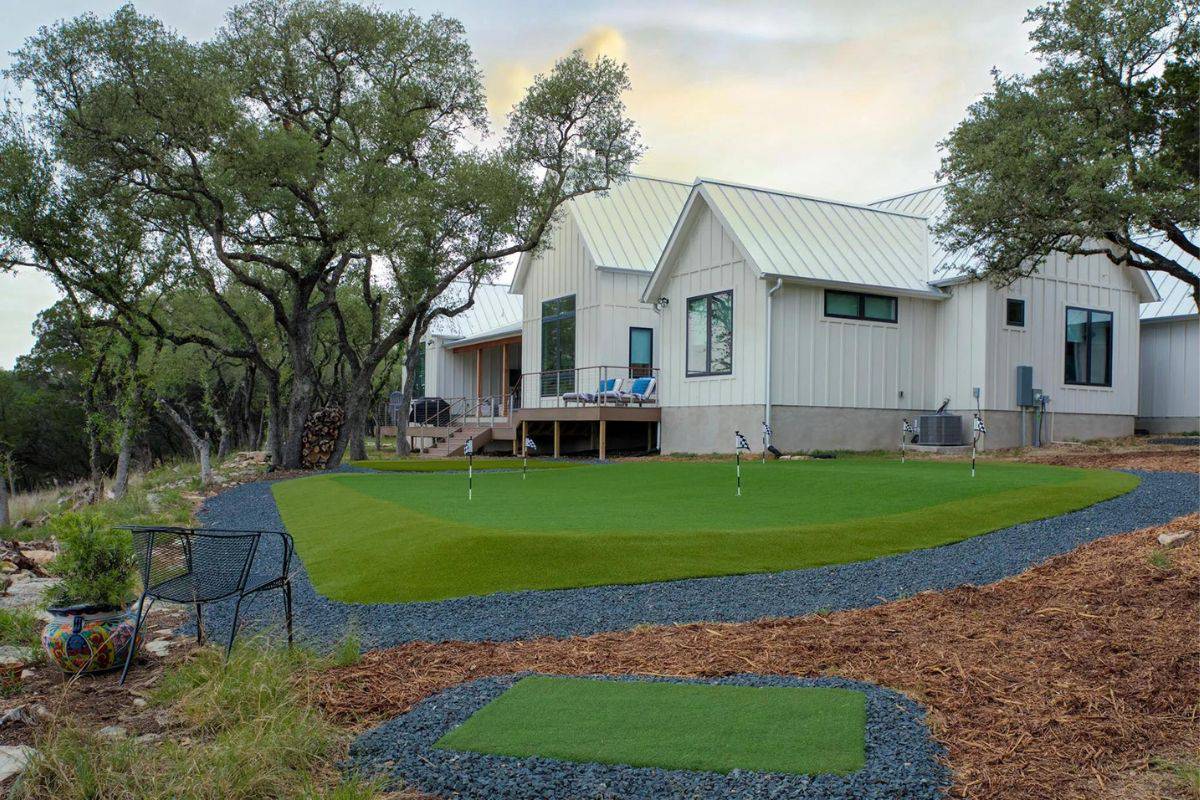
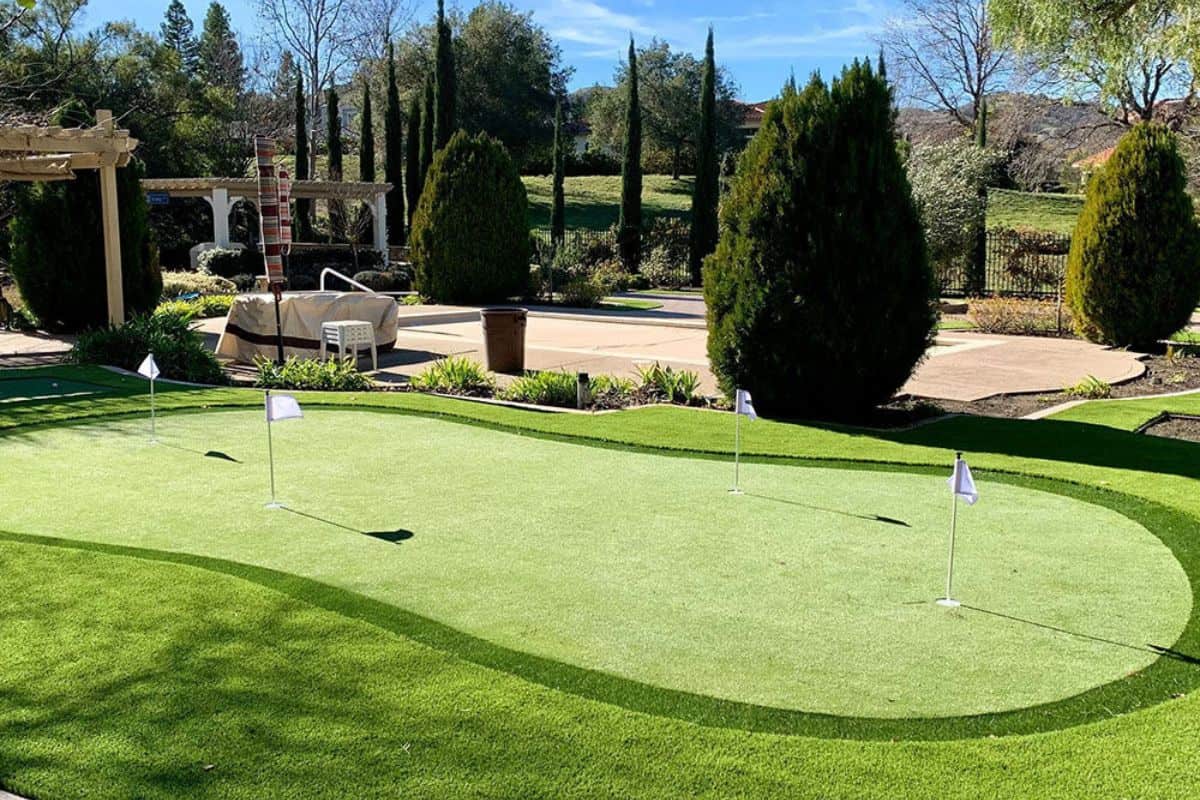

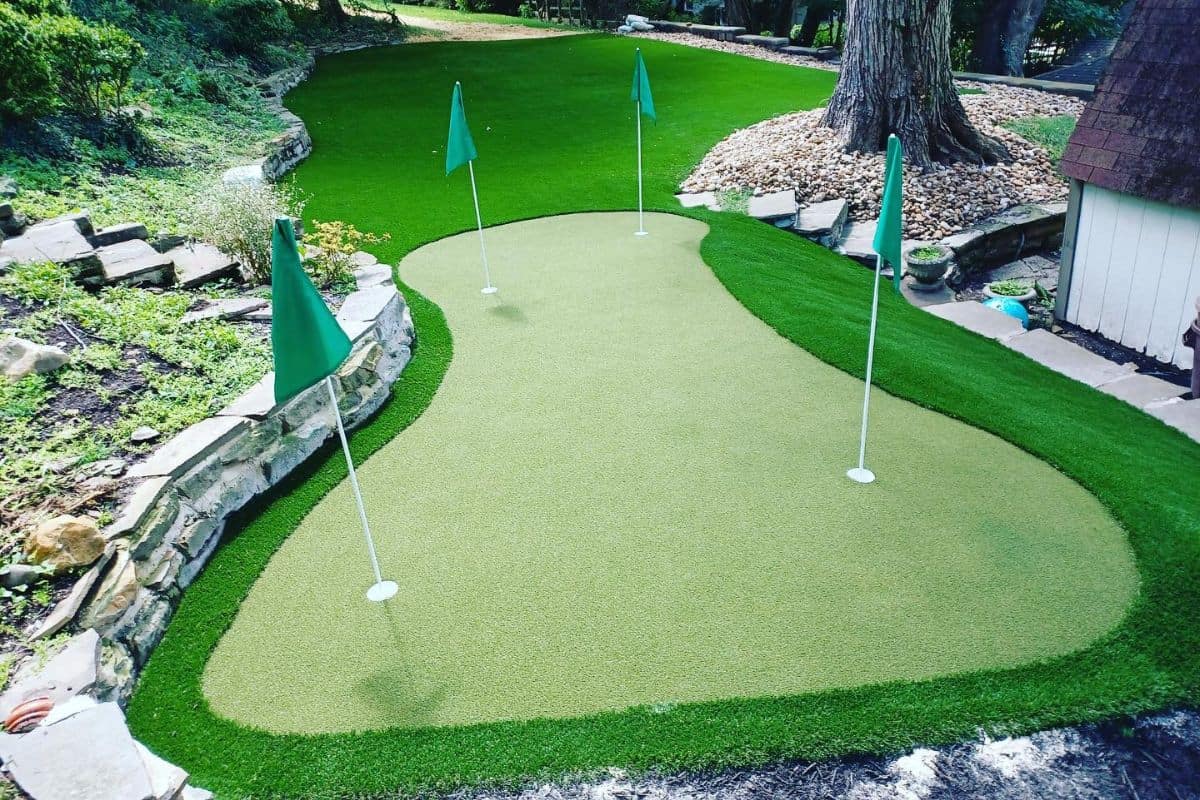
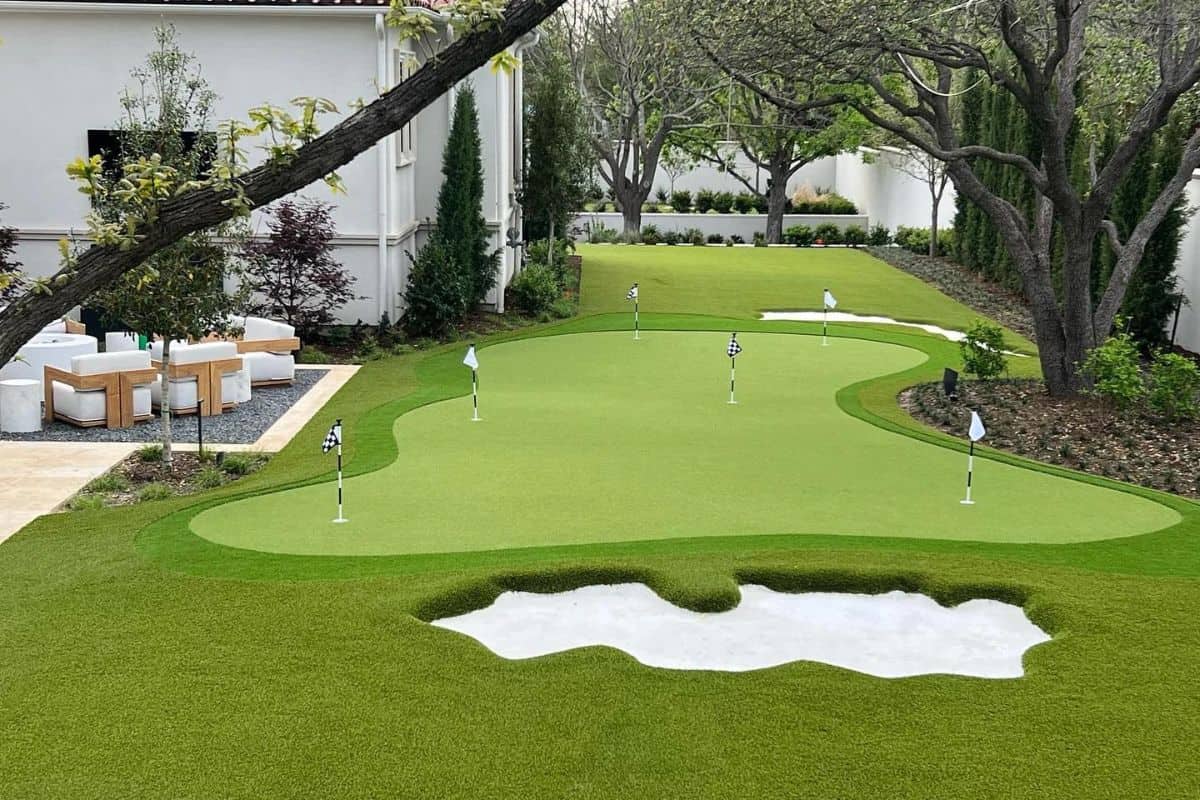
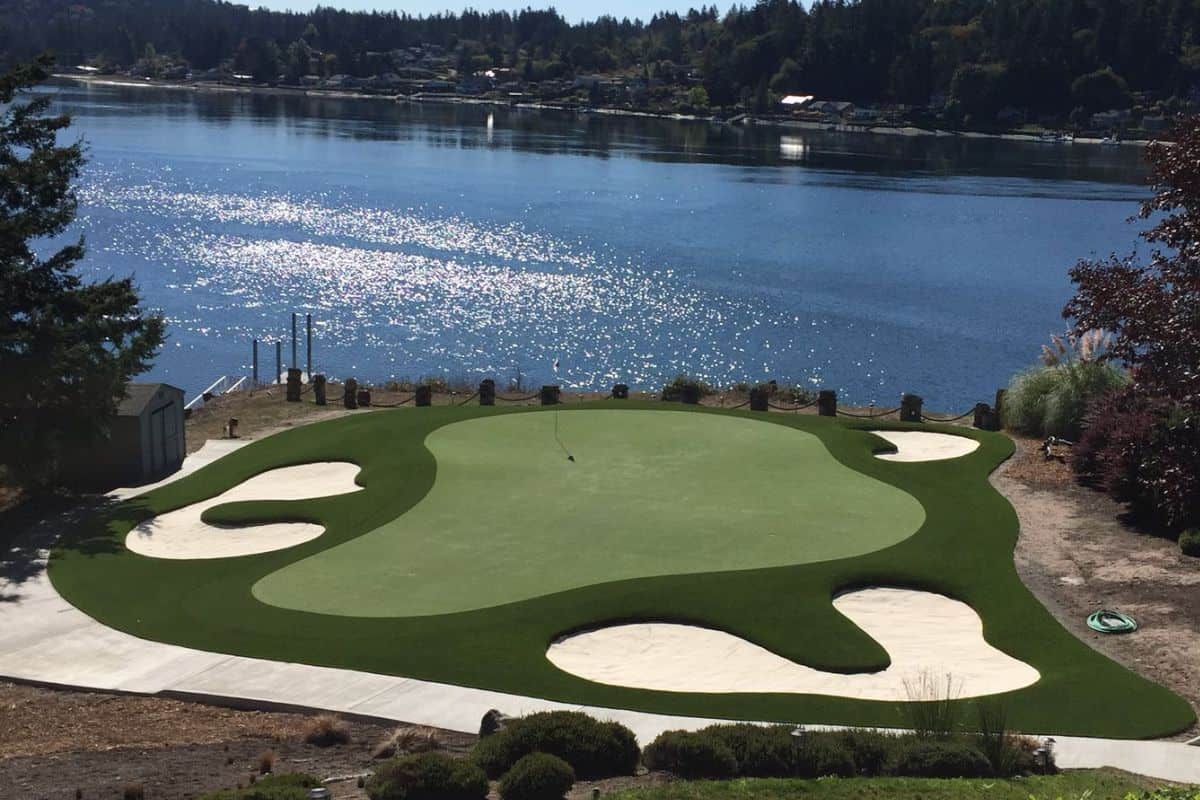


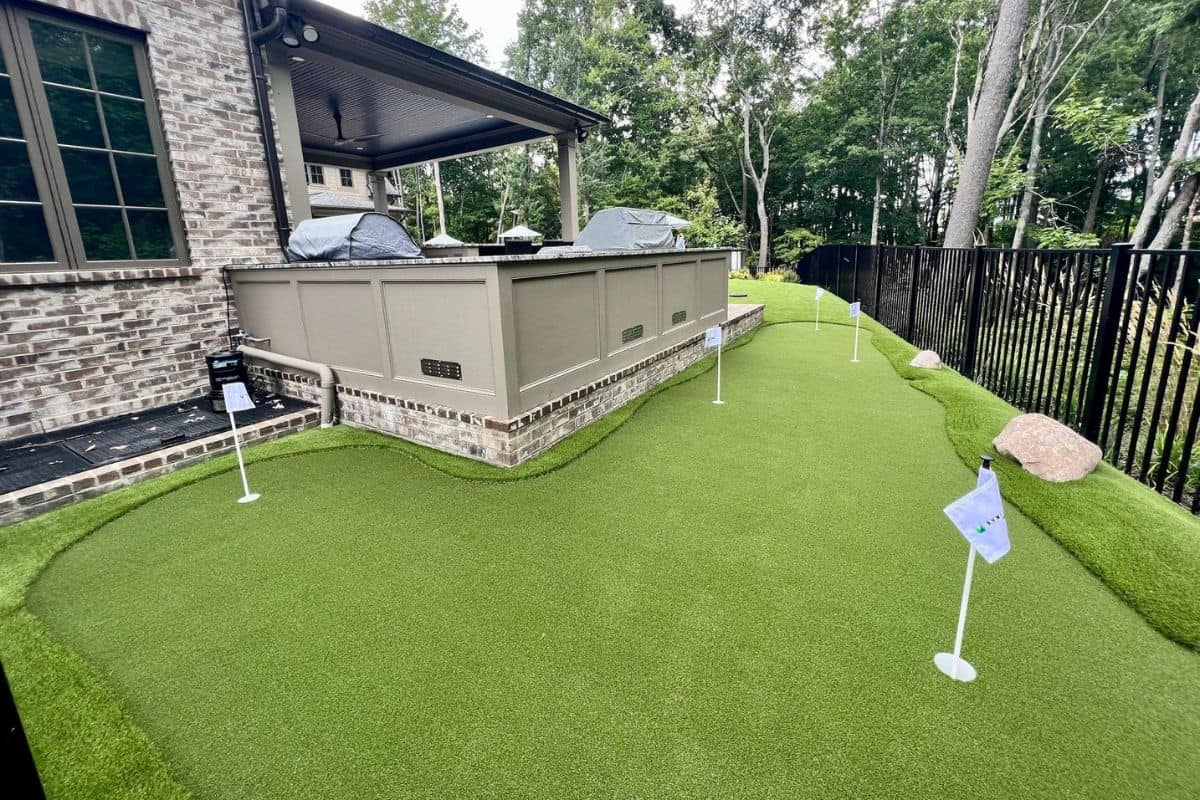
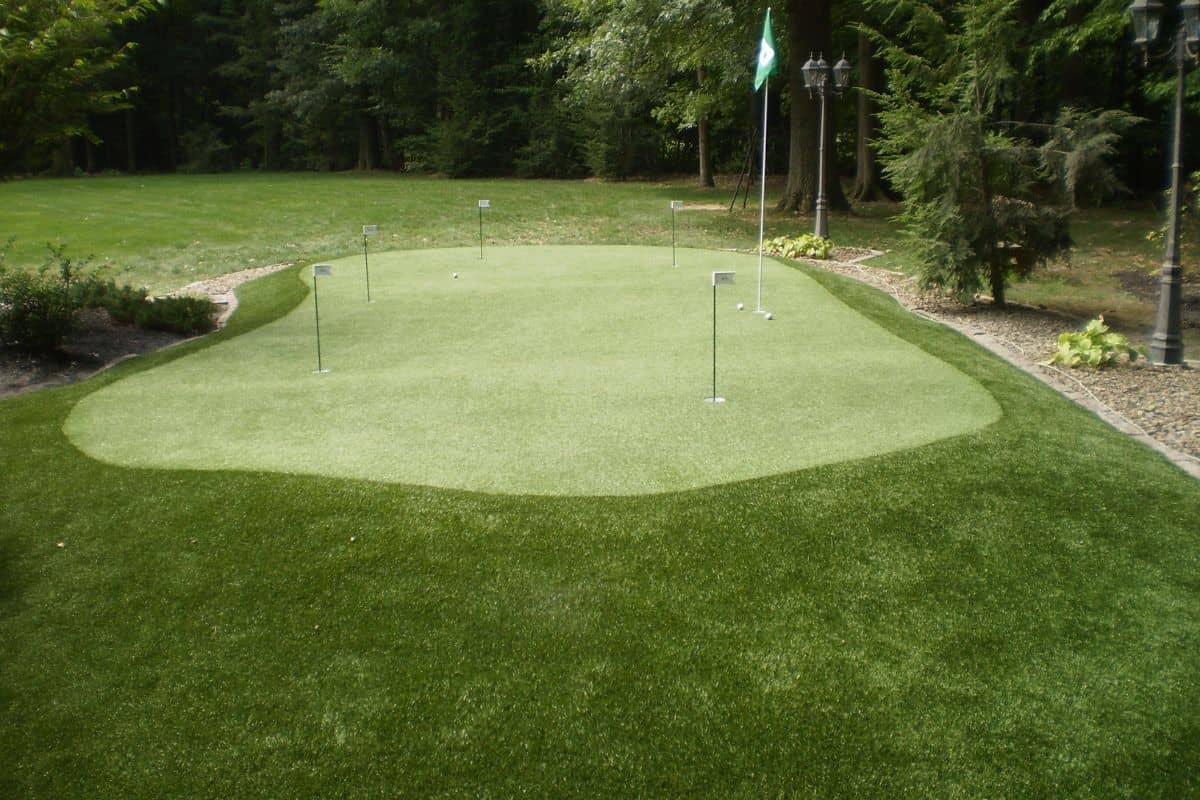
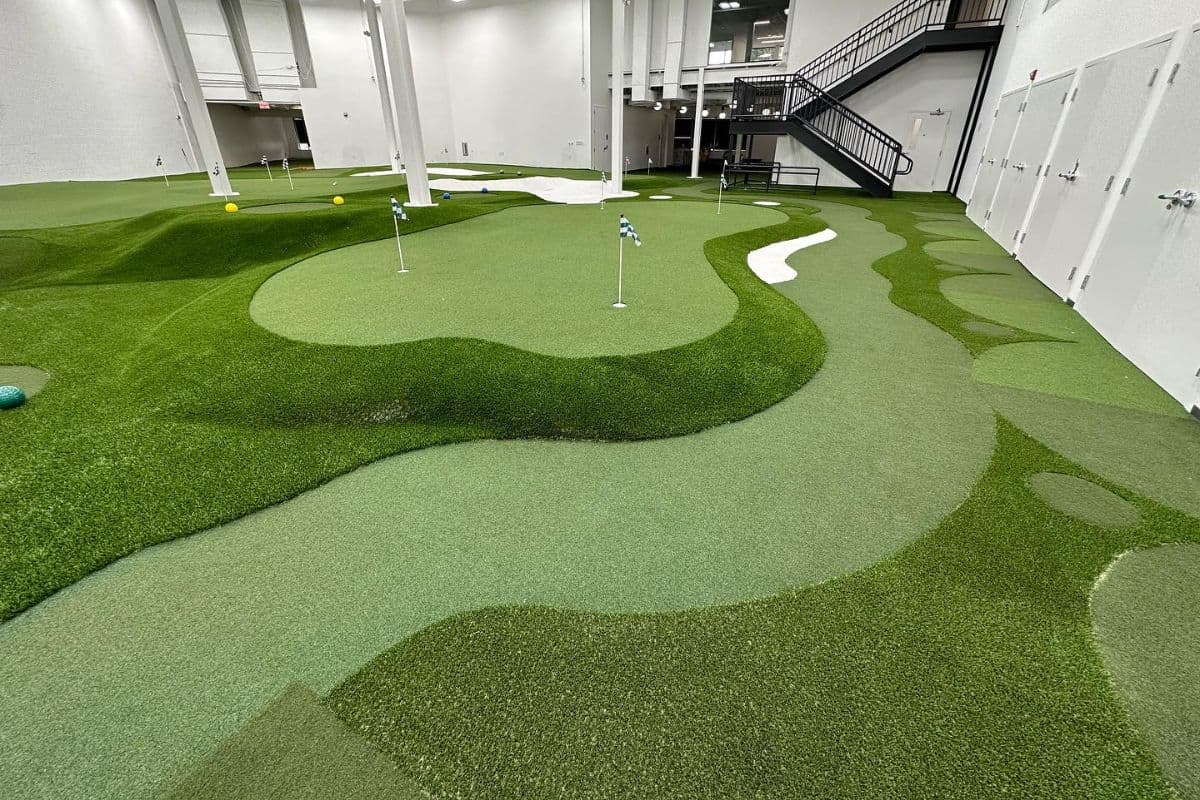

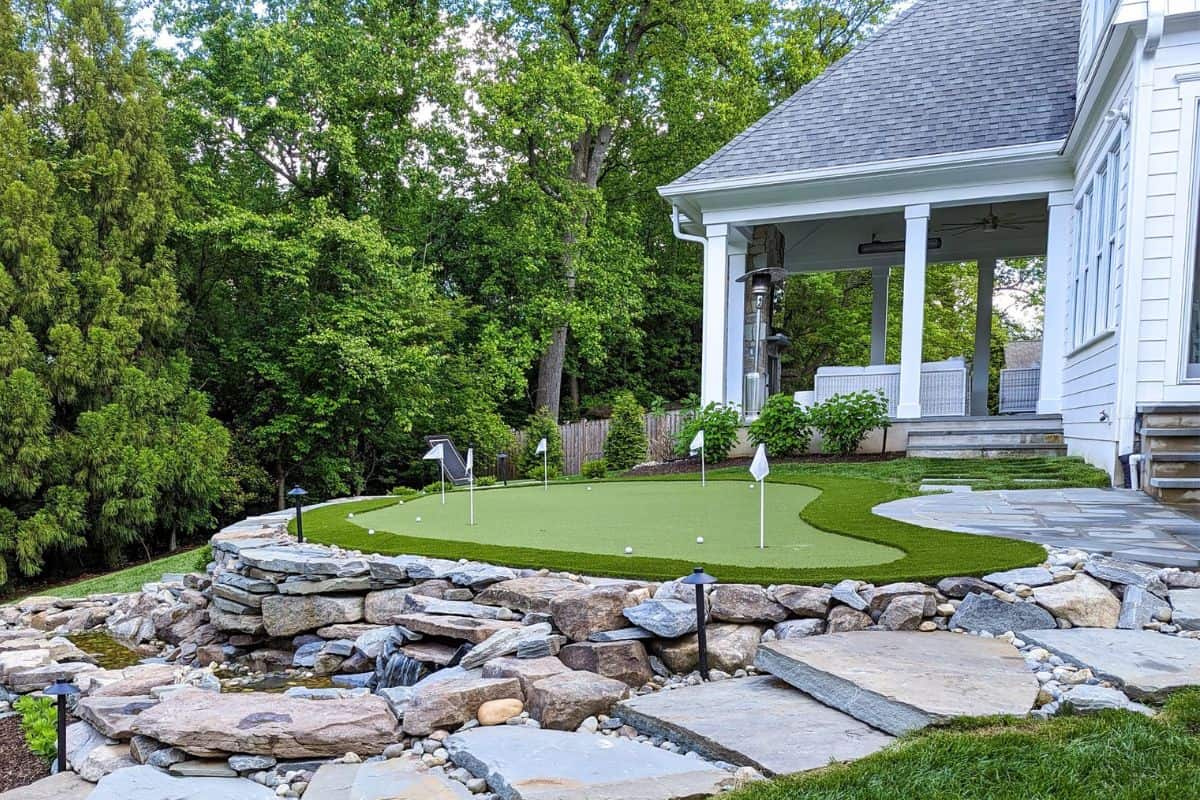
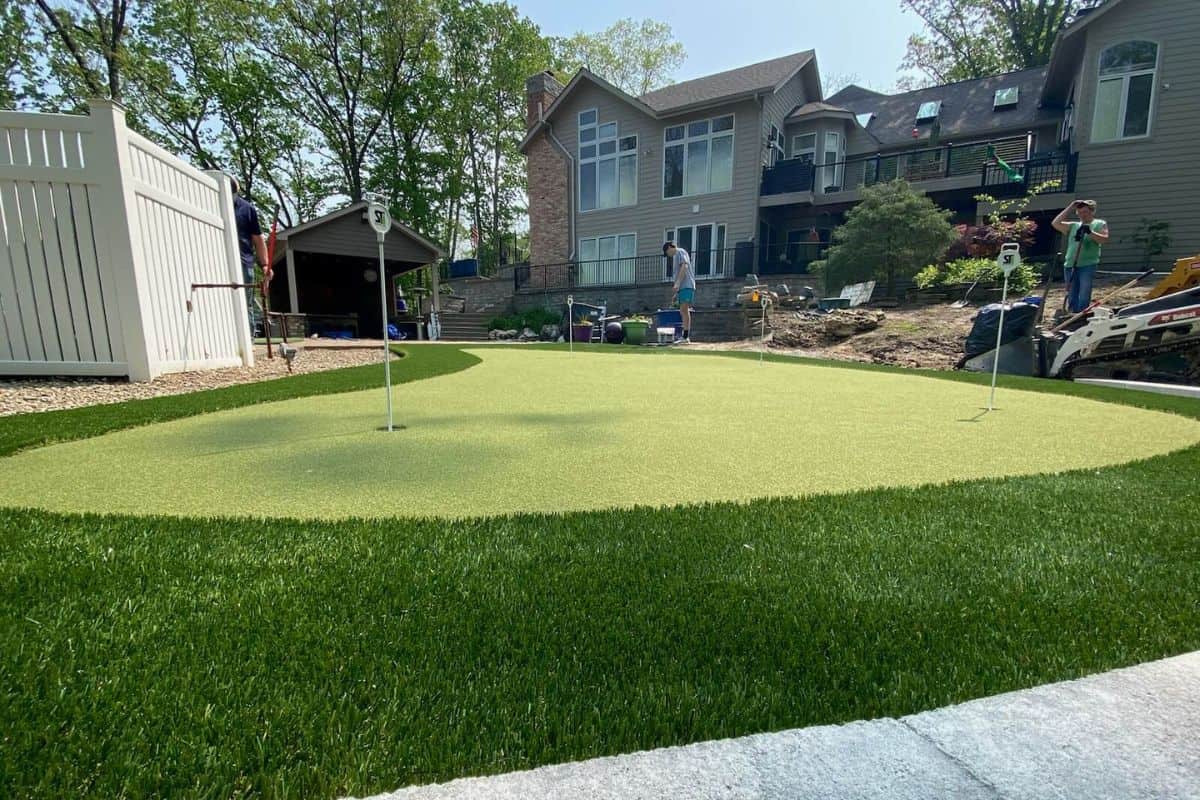
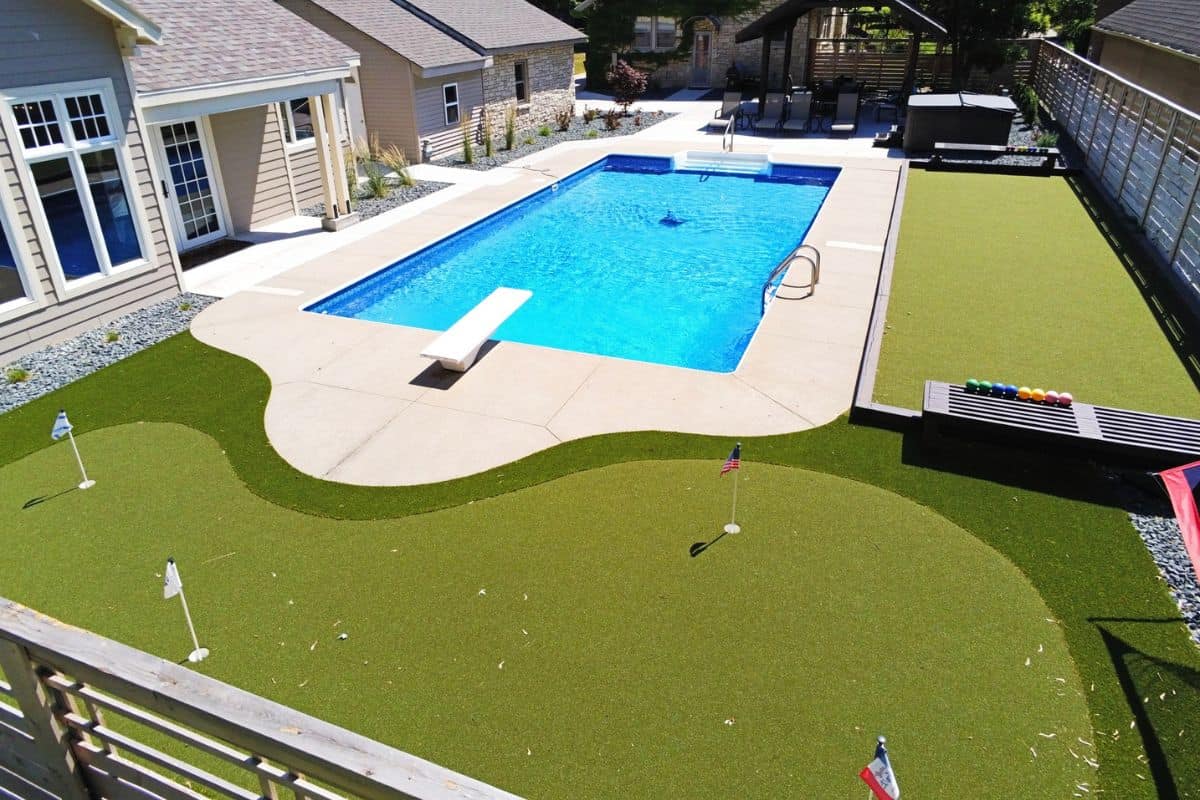
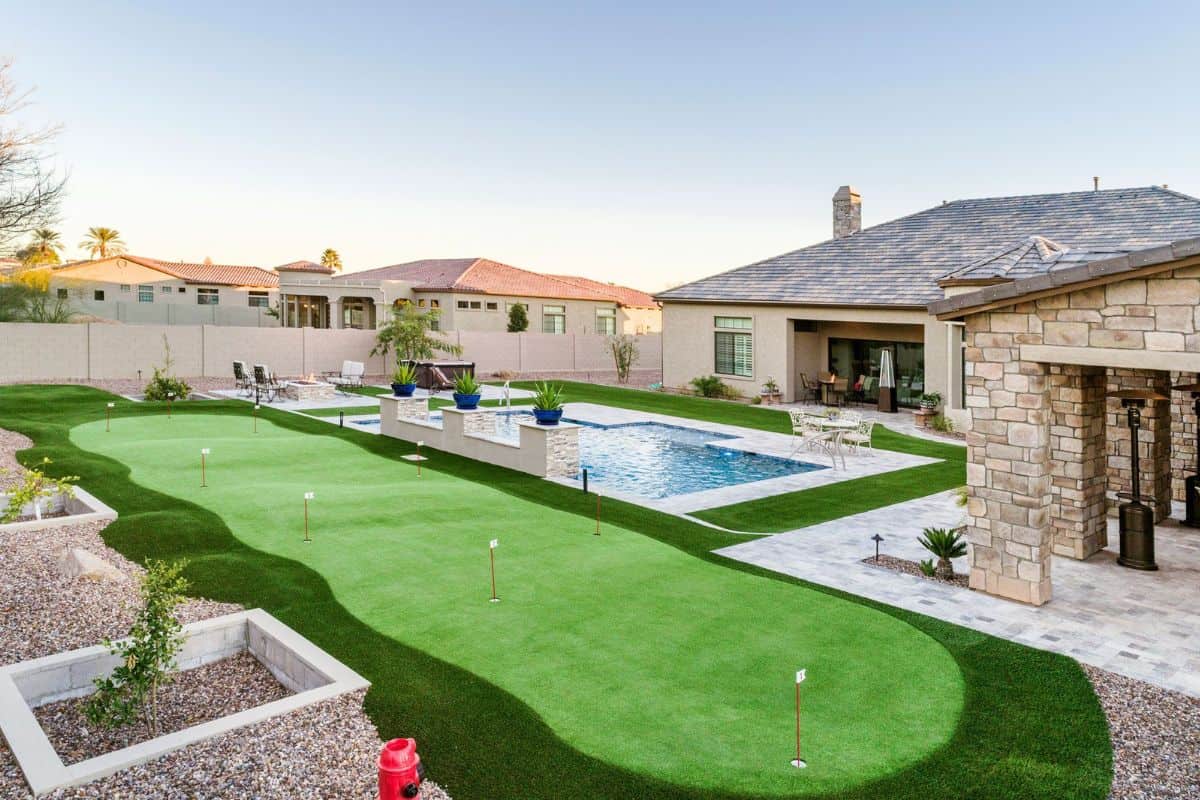
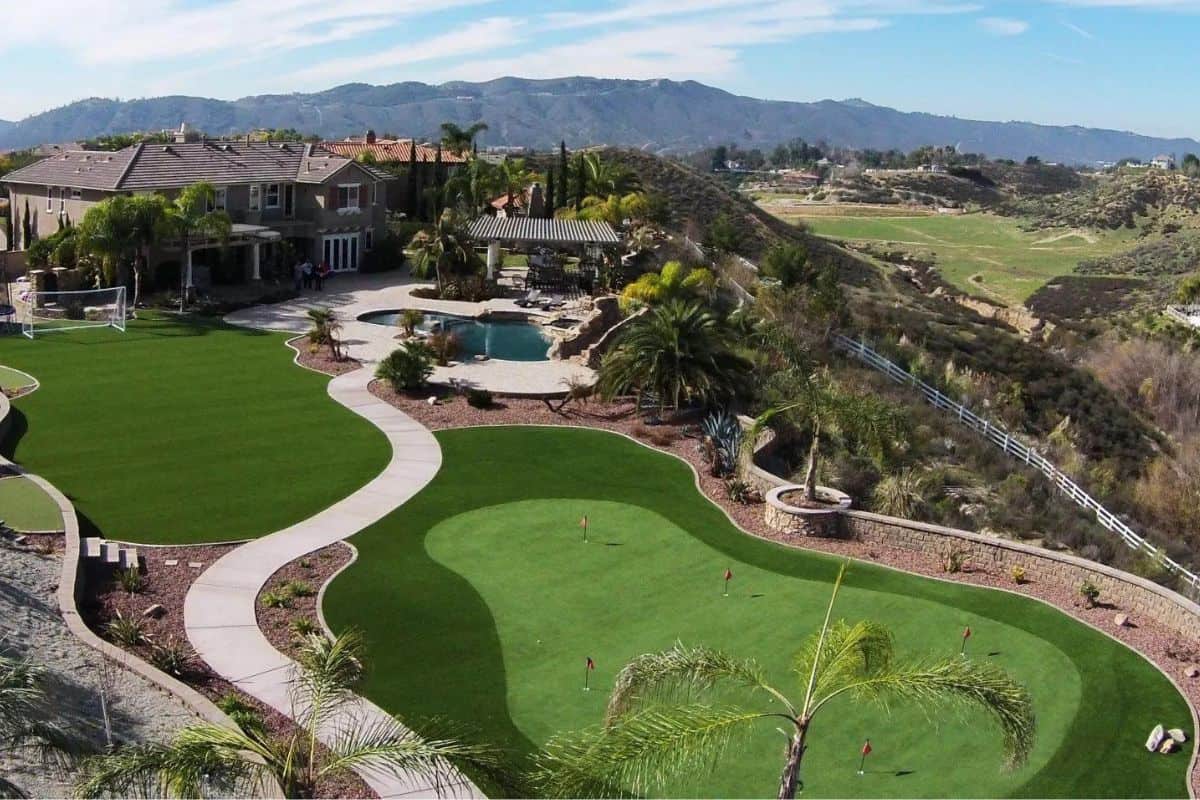
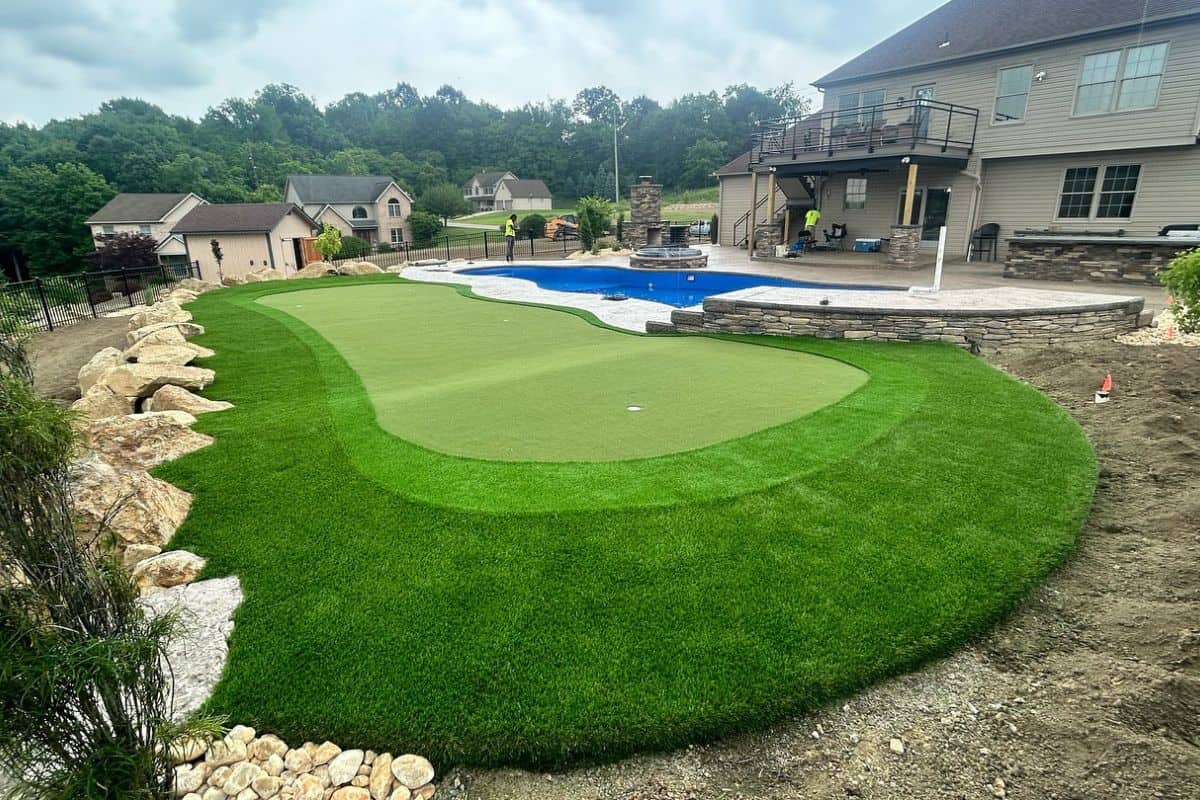
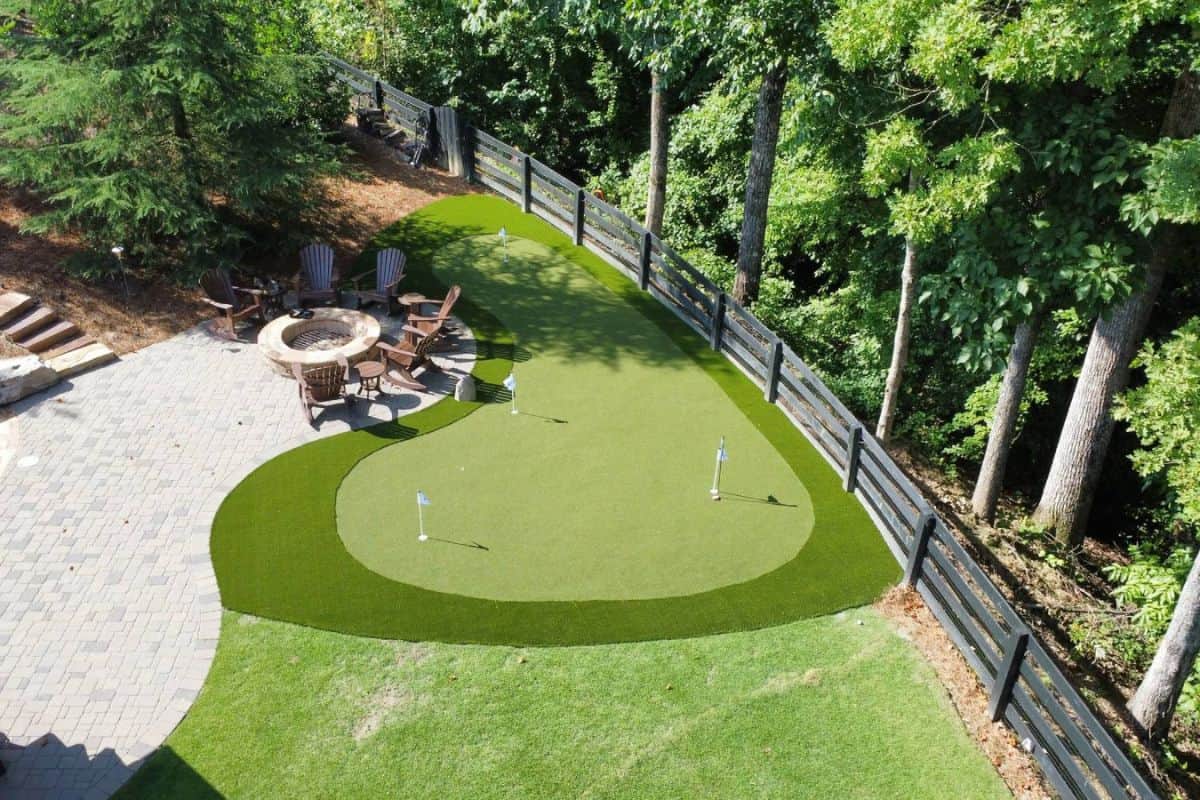
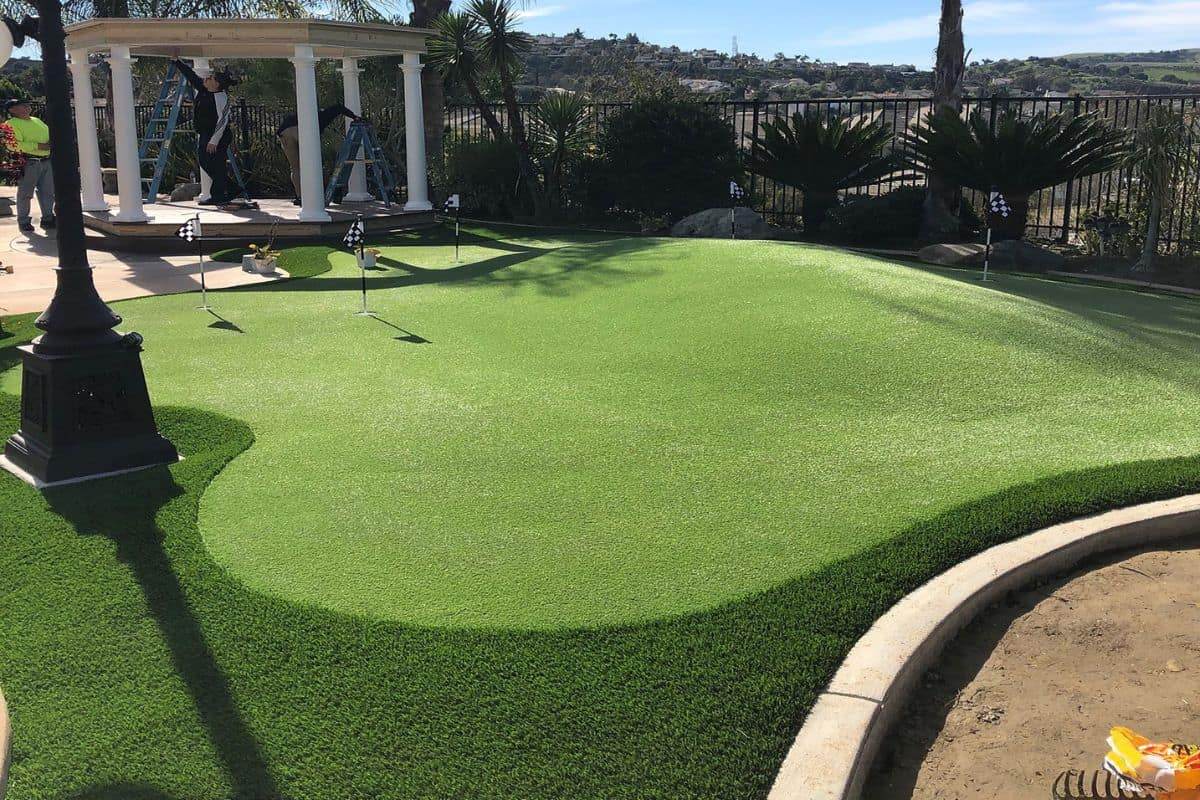
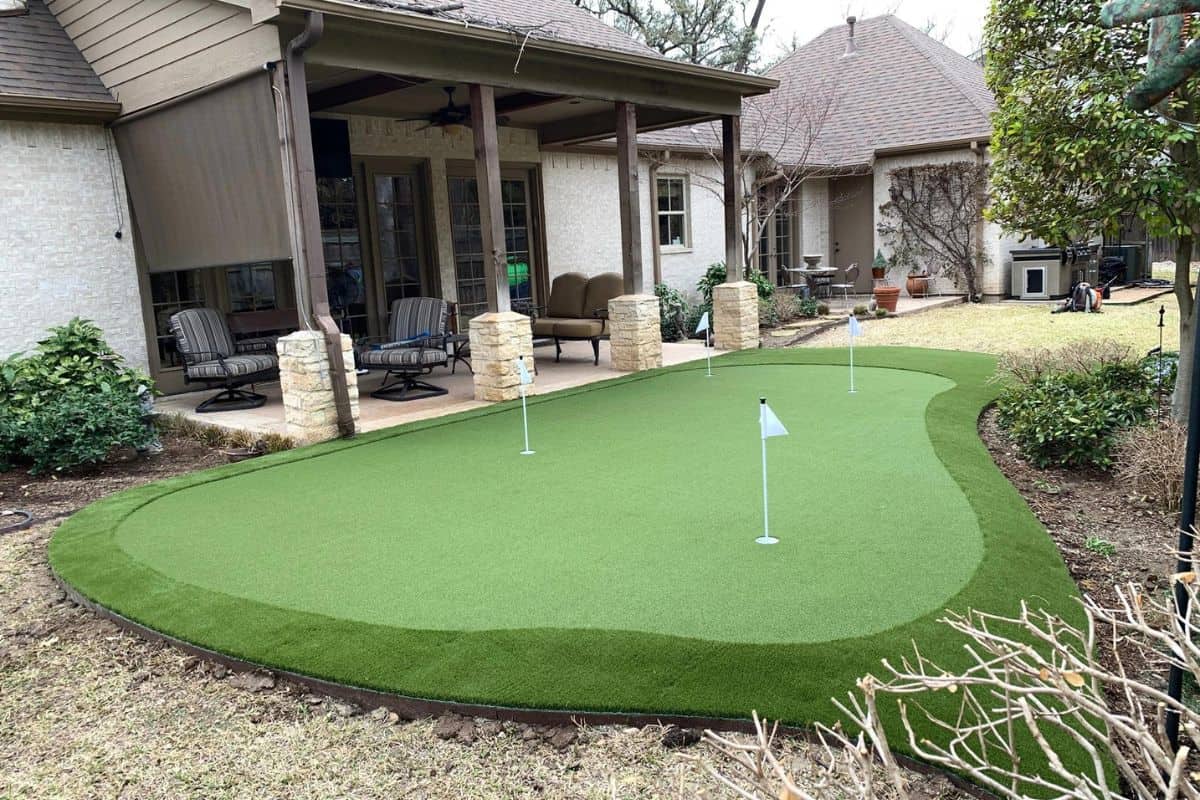

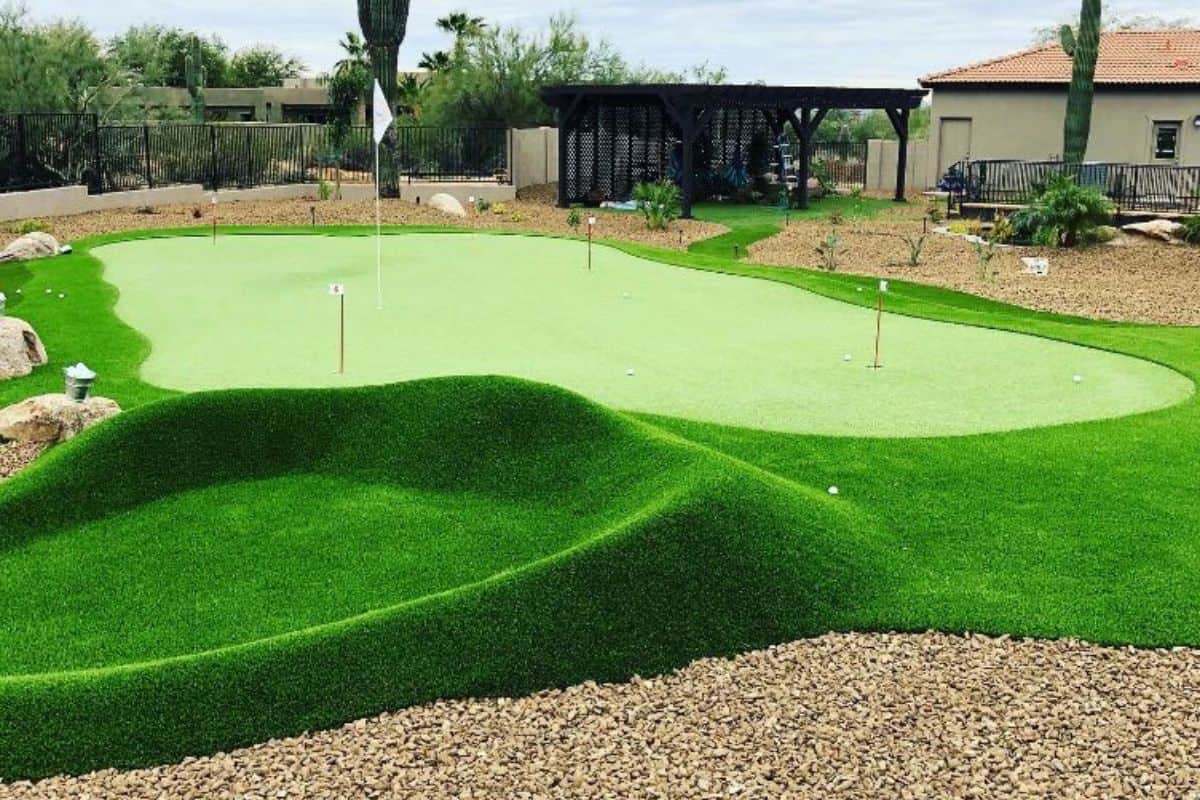
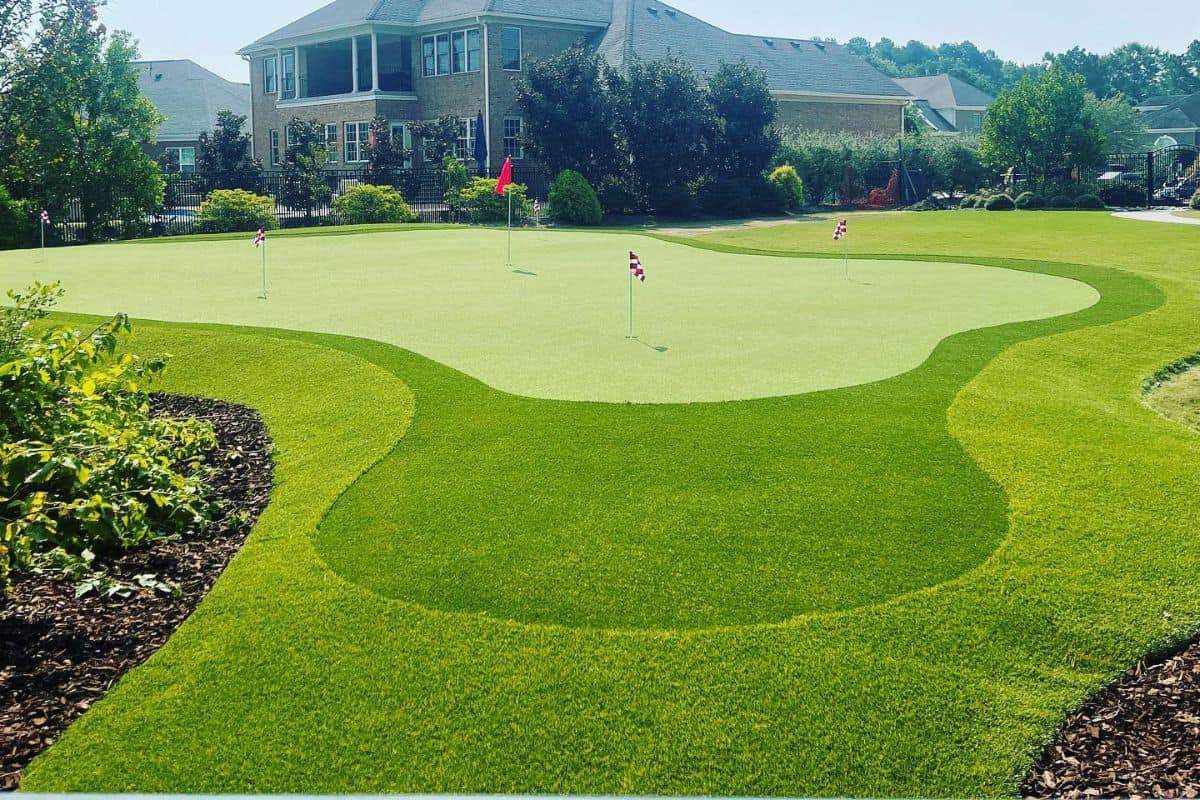
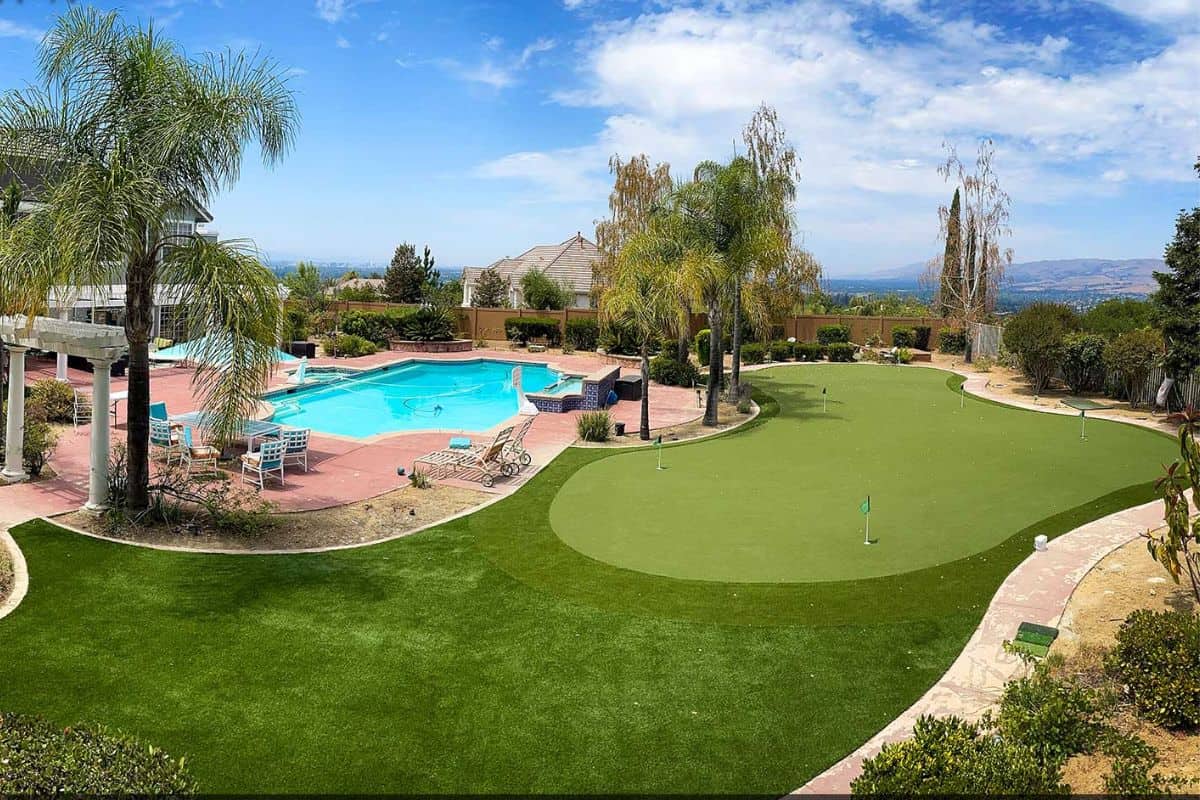
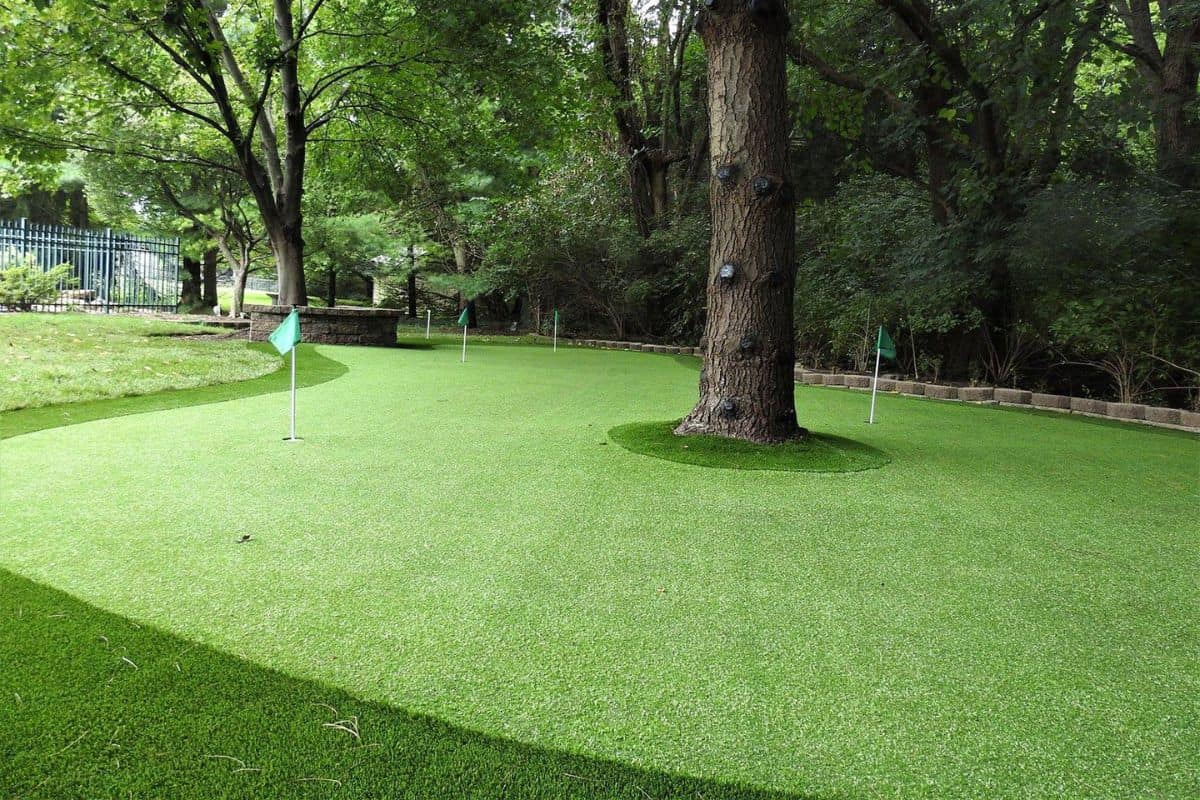
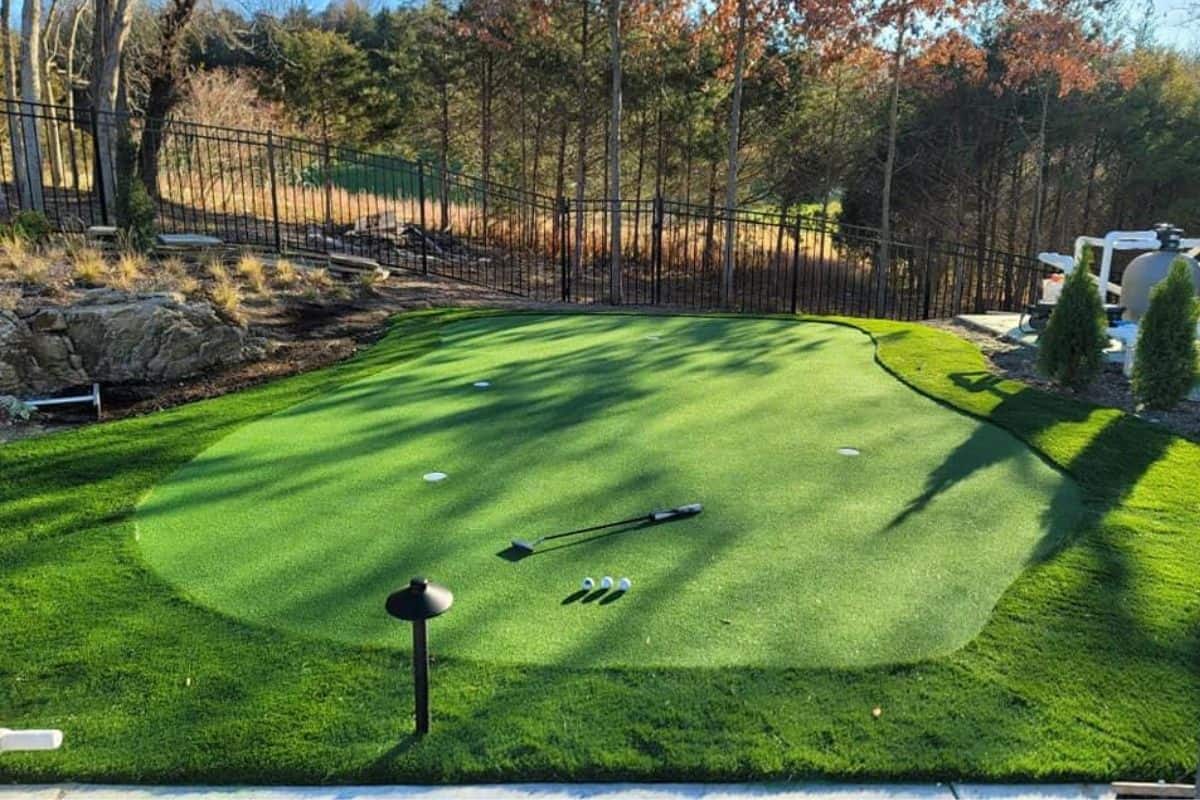
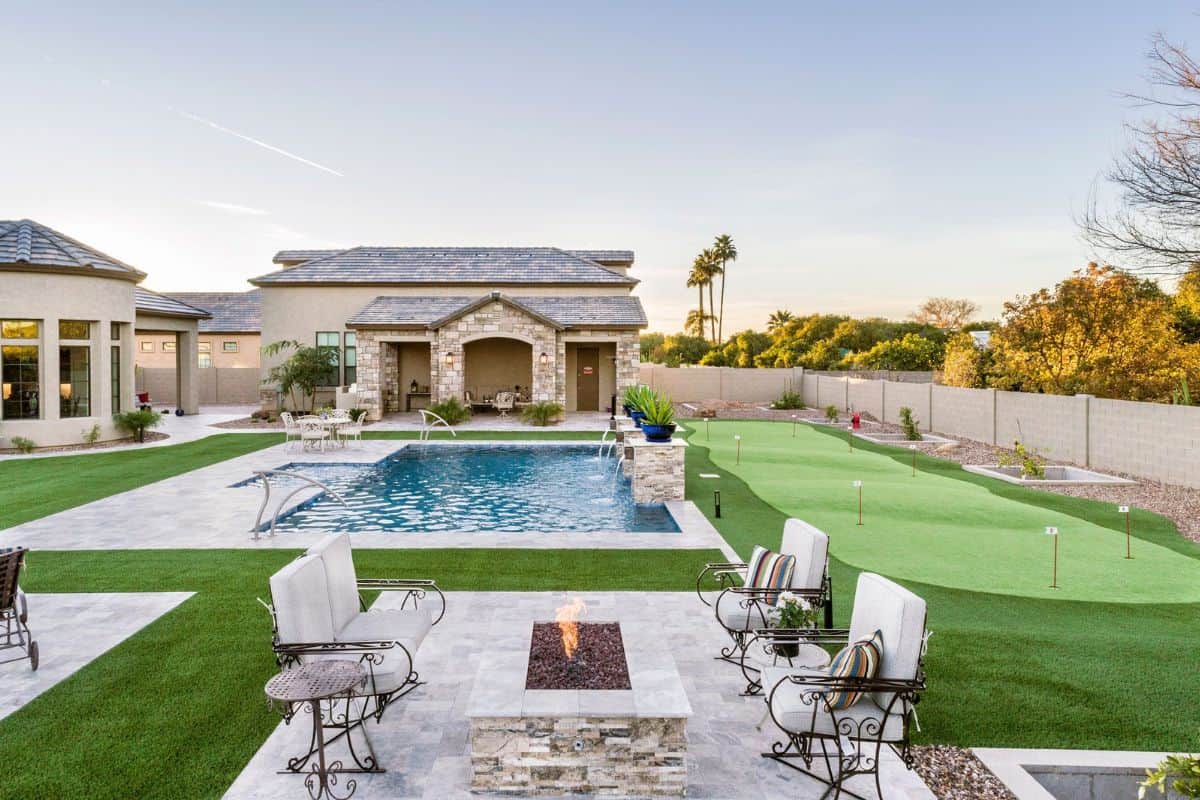
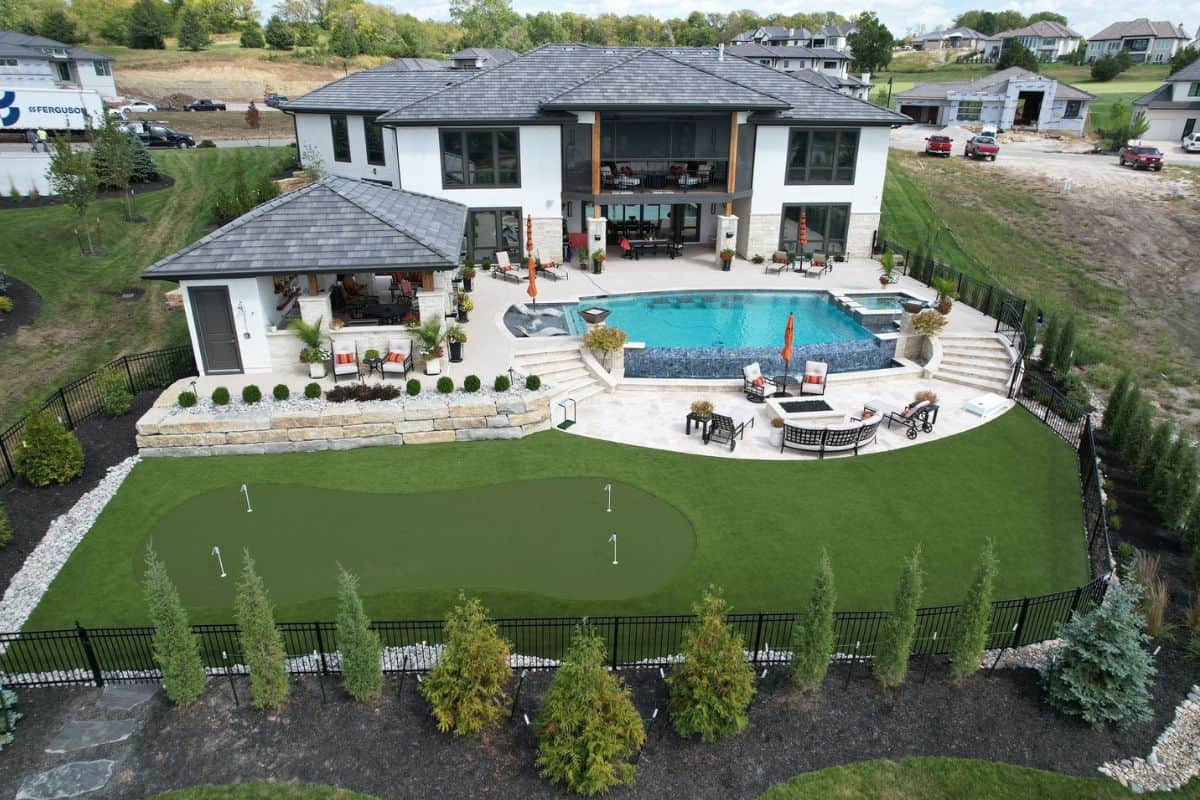
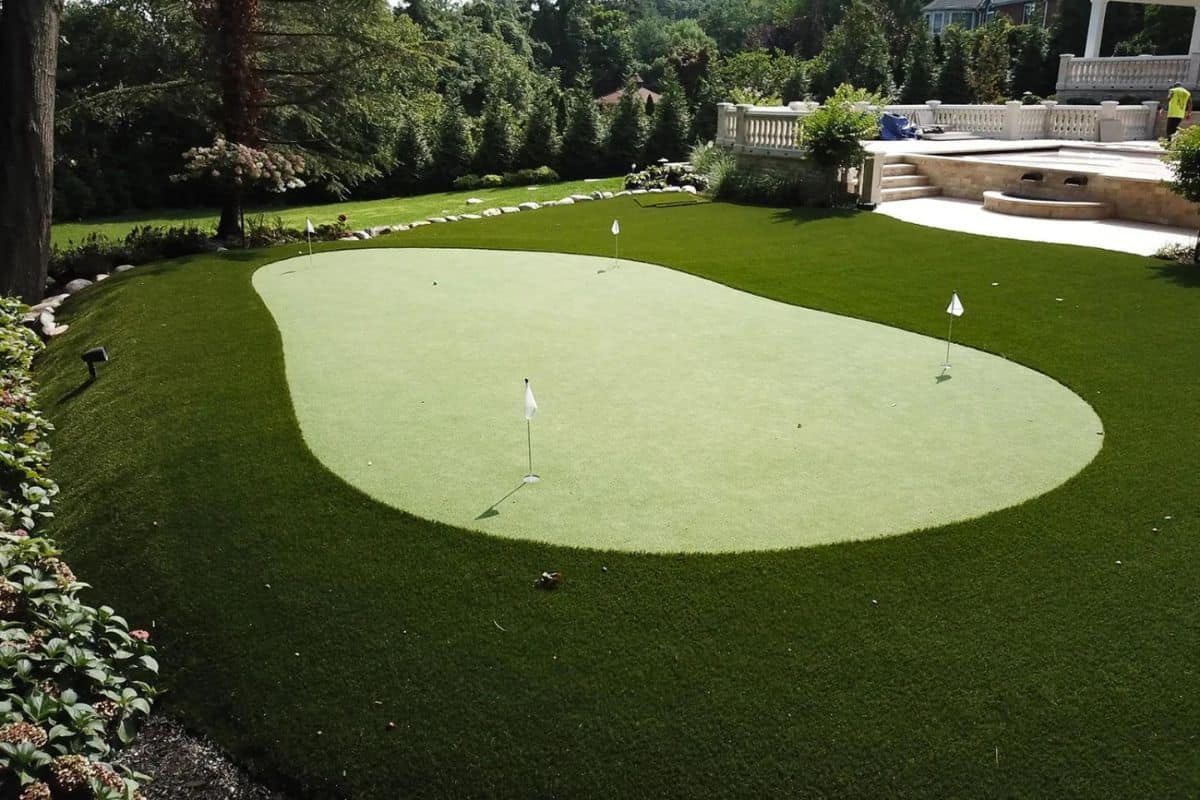

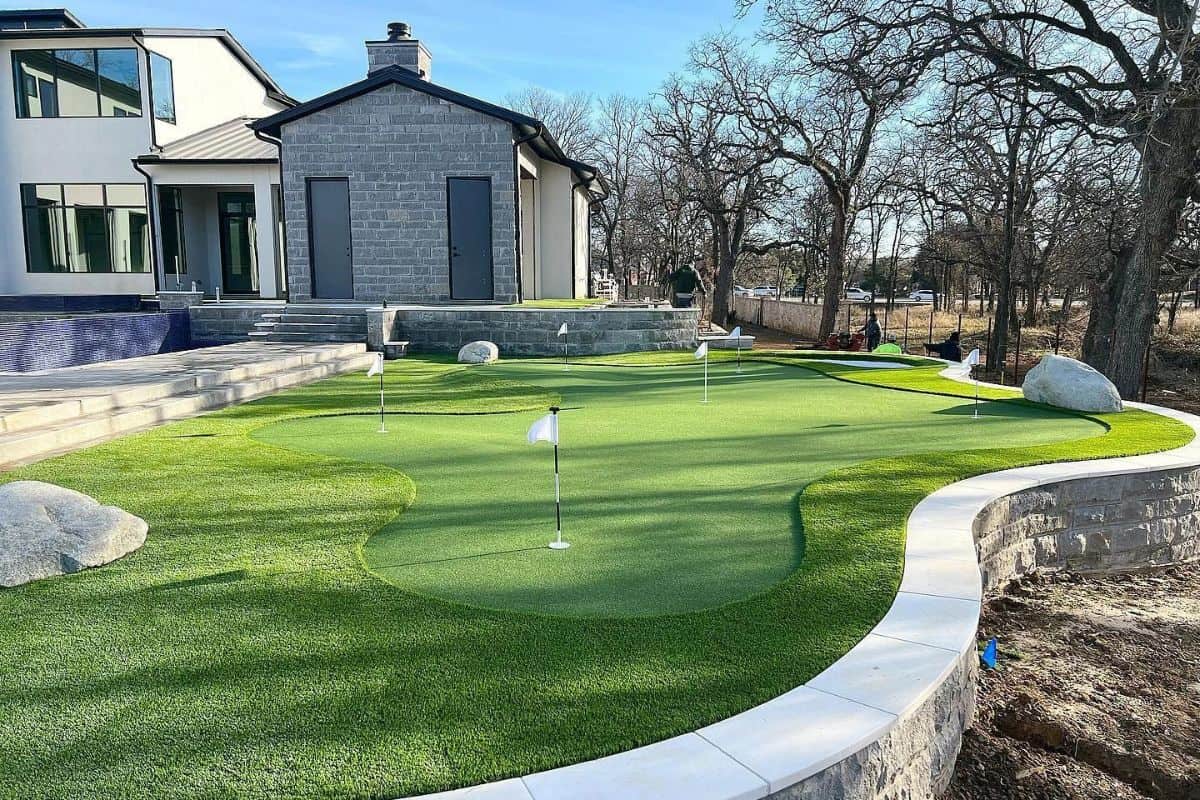
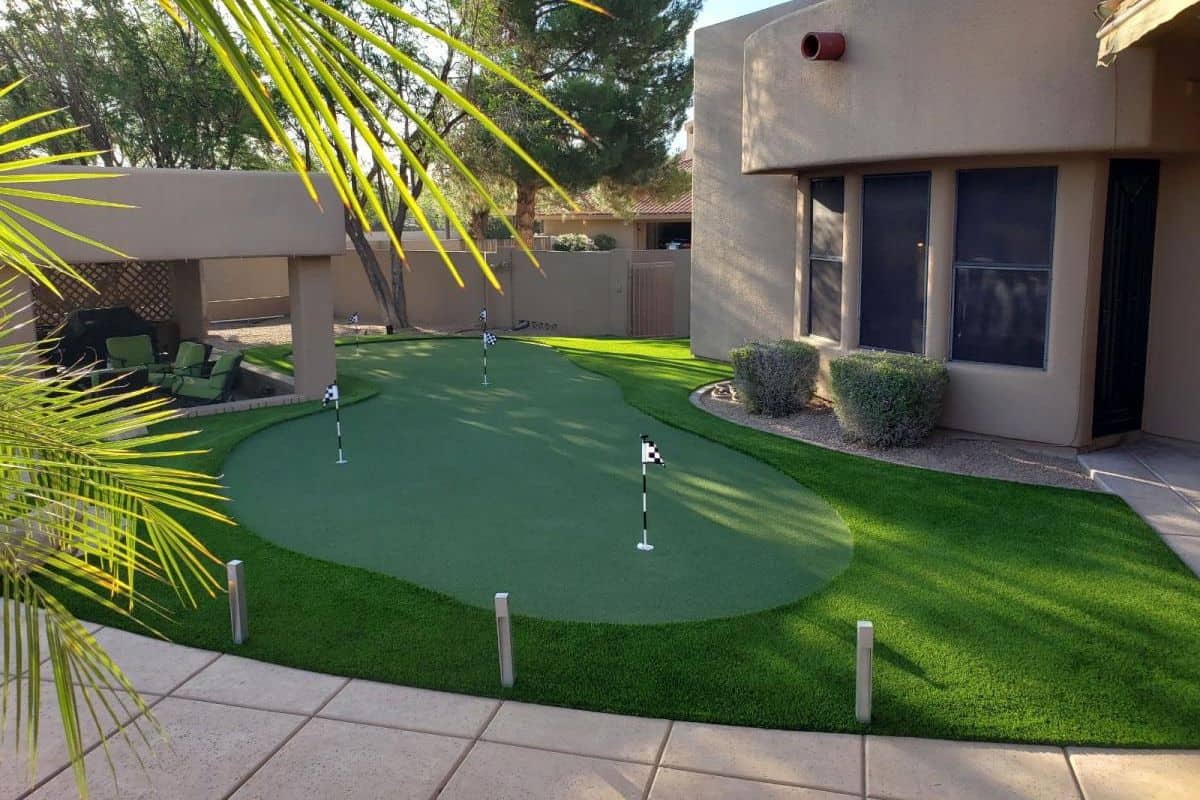





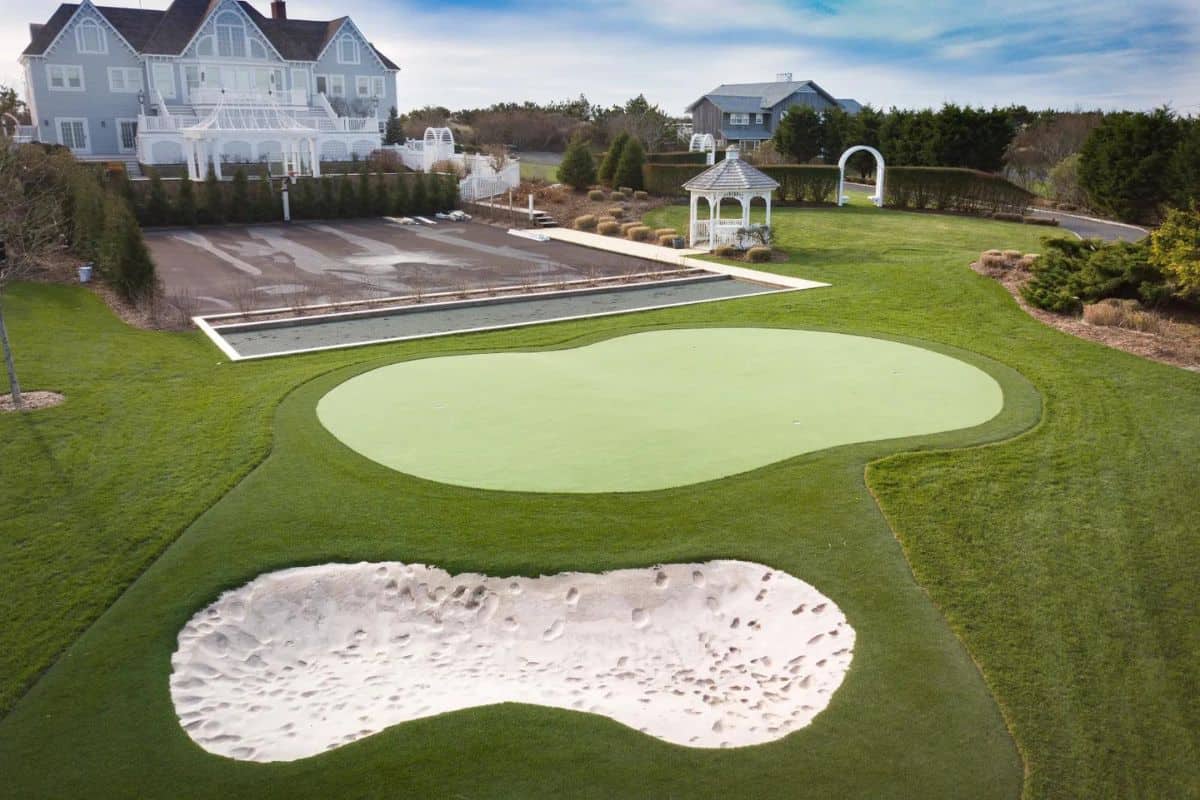
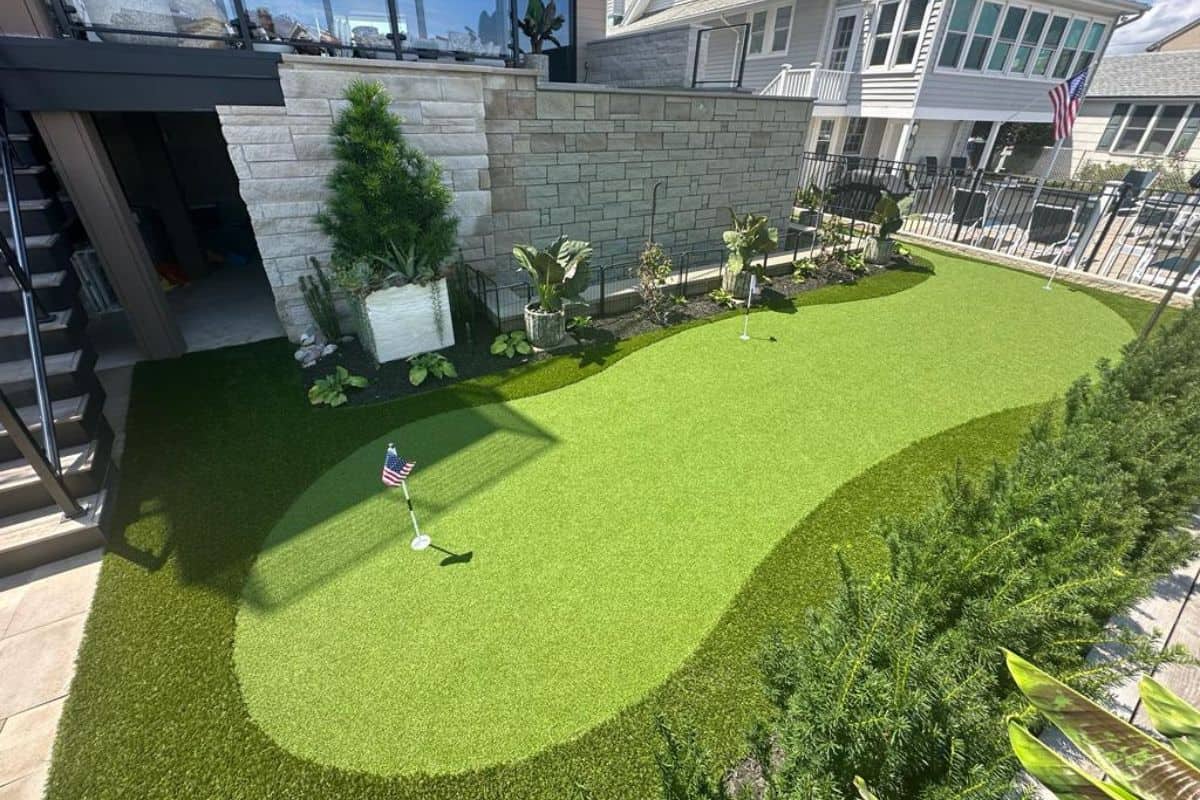
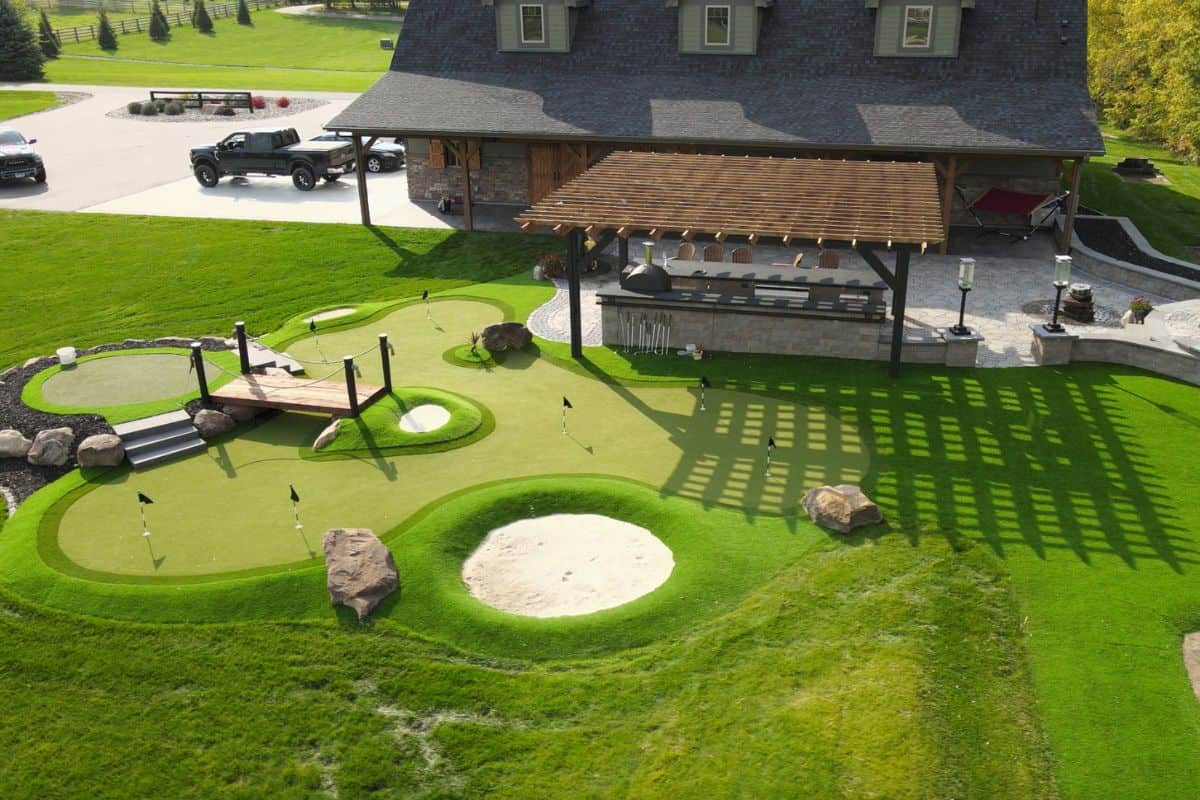

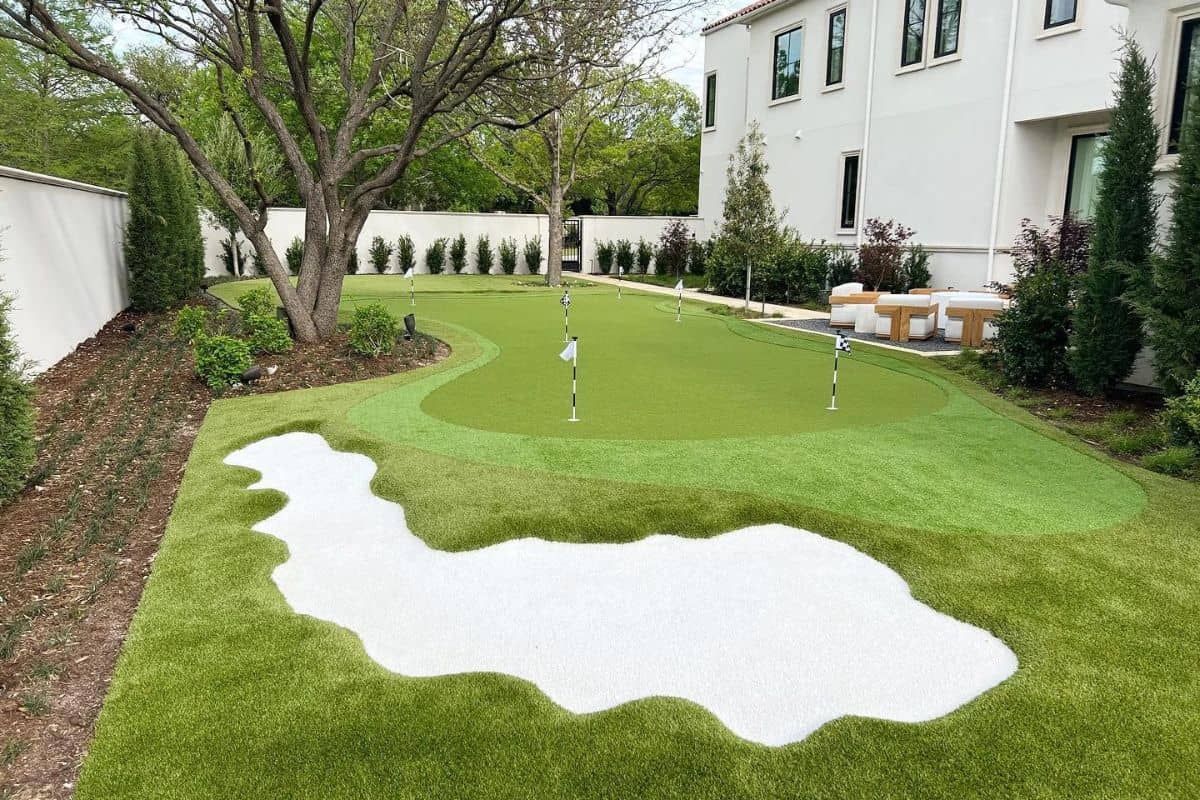

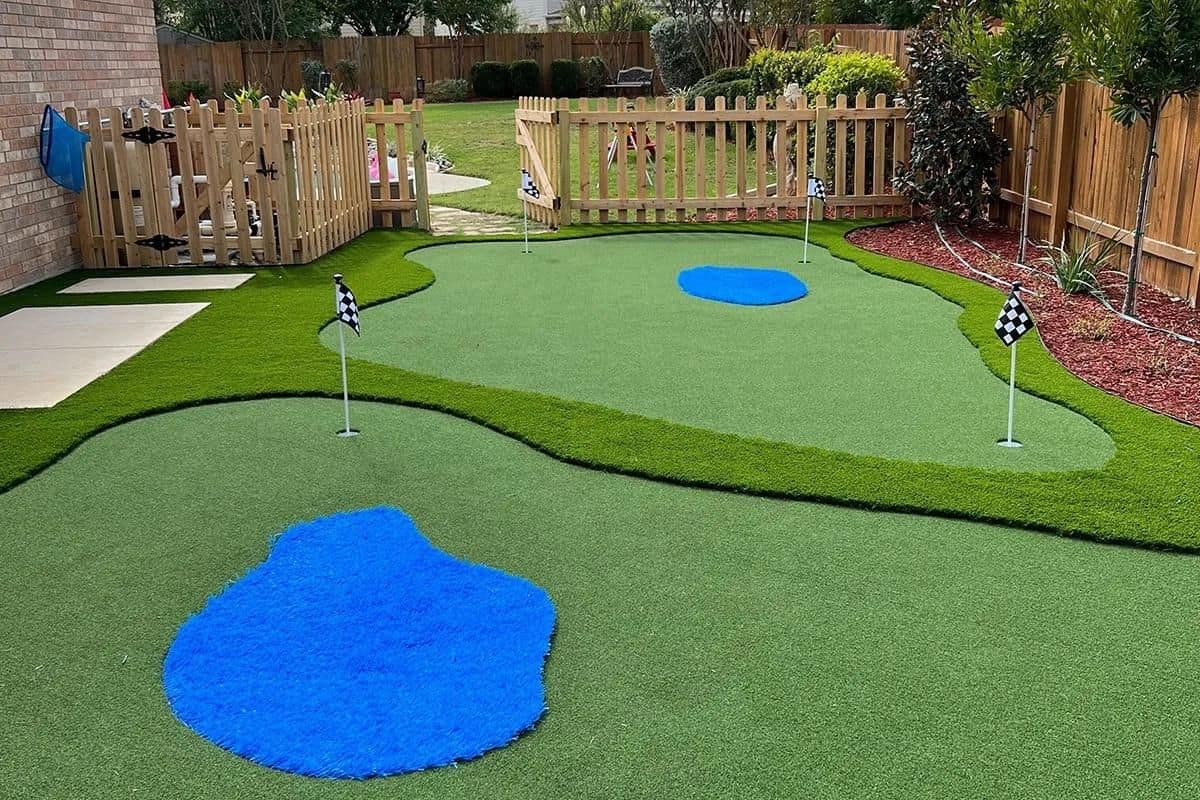
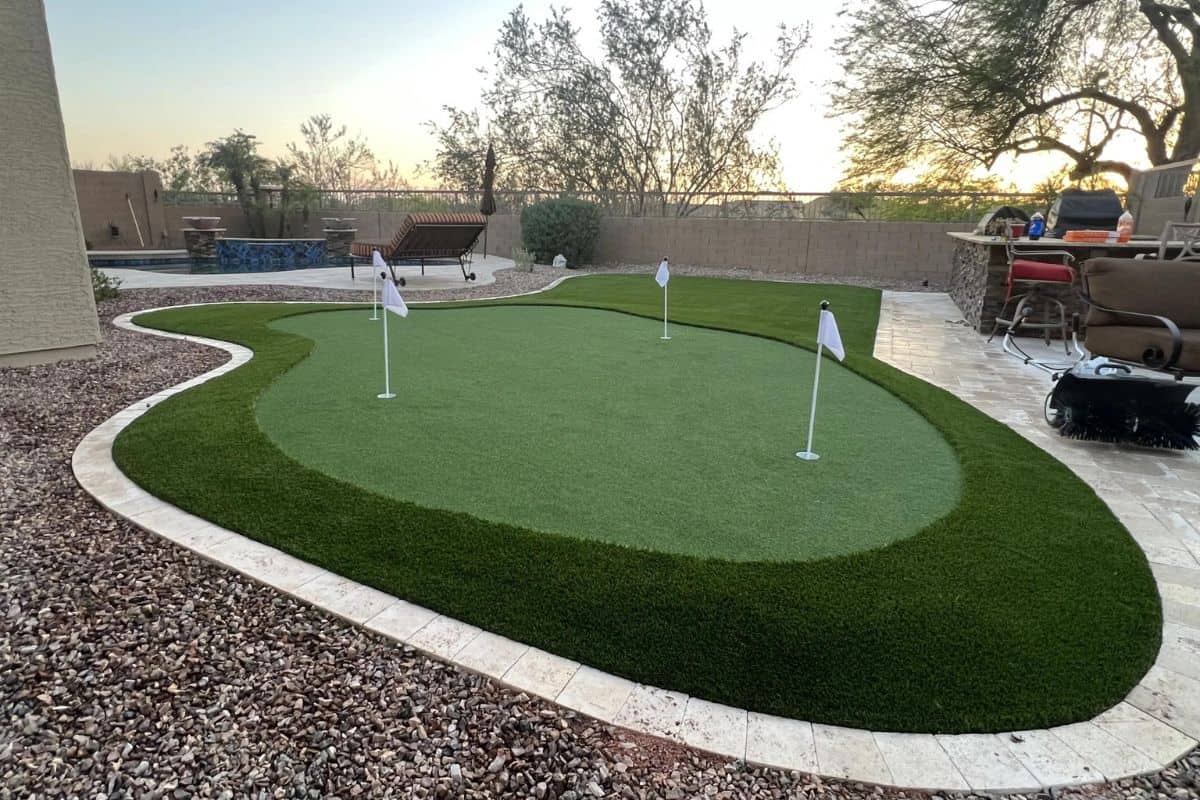
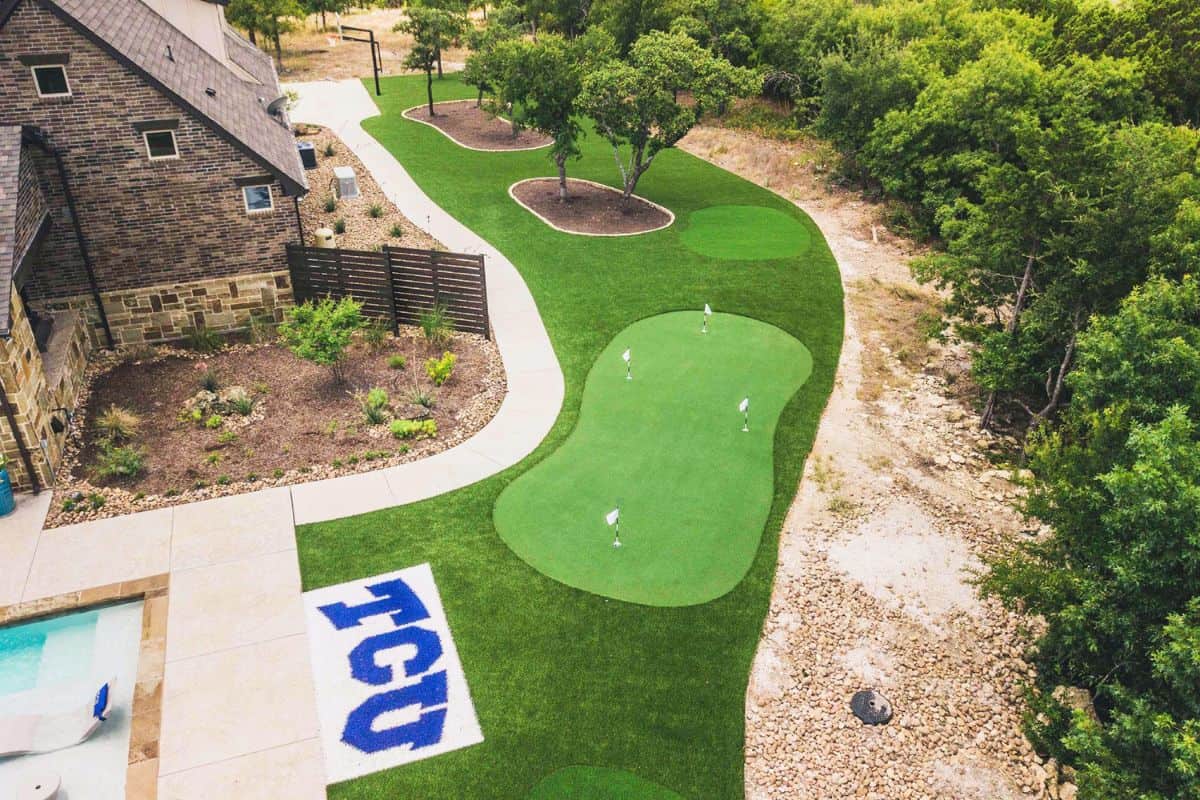





![Turf Network White Logo [500 x 100]](https://turfnetwork.org/wp-content/uploads/2023/10/Turf-Network-White-Logo-500-x-100.png)